Protect Your Trip »
Is a travel agent worth it the pros and cons.
Travel experts agree there are several advantages to hiring a vacation planner.
The Pros & Cons of Using a Travel Agent

Getty Images
A travel agent can save you money and time.
Need to pivot your trip plans but don't want to deal with the extra time, money and hassle of rebooking flights and accommodations on your own? That's just one area where a knowledgeable travel agent (also commonly known as a travel advisor) can help. Read on to discover the other benefits – as well as the downsides – of using a travel agent, so you can confidently decide whether or not a travel agent is worth it for your next trip.

The Pros of Using a Travel Agent
Travel agents can save you money – and get you other perks.
"In some cases, you'll actually get a better deal by working with a travel agent," says Jackie Steele, travel expert at MagicGuides . "This could be in the form of a cruise onboard credit (free spending money to use on the ship), access to special agency/group rates, or even just learning about a discount you qualify for but weren't aware of." The best agents will even keep an eye on new discounts as they're announced and apply them to your trip even after you've booked, he notes.
Travel agents handle all the details
Hotel room? Booked. Dinner reservations? Made. Tour tickets? Ready to go. A travel agent handles every detail of your vacation itinerary. "The traveler still gets to be involved in the fun part of dreaming up ideas and providing their travel wishes, while we take and perfect them," says Jessica Parker, founder of Trip Whisperer .
Molly McShea, owner and travel advisor at McShea Travel , points out that travel agents can also help with timing logistics. "Travel agents know how many days should be spent in each destination, which tours go together, and how many things you should do in a day," she says, adding that crafting an itinerary can be challenging if it's not something you regularly do. Additionally, travel agents can help you choose the best time to visit your preferred destination(s) based on seasonality and your budget, and sift through travel insurance policies to find the best option for your needs.
Travel agents can provide local expertise
"A travel advisor's industry connections and relationships provide added value to their clients," says Valerie Edman, a luxury travel advisor and agency owner at Cultured Travel LLC. She says when working with a travel agent, travelers gain access to a global network of connections including:
- In-destination specialists who work exclusively with travel advisors and can connect travelers with unique, off-the-beaten-path experiences they wouldn't otherwise know about
- Exclusive experiences not available to the general public
You'll avoid surprise fees
When deciding if a travel agent is worth it for you, remember this: A reputable agent can guarantee you won't encounter any surprise fees on accommodations and activities once your trip is booked.
You'll have someone to troubleshoot unexpected travel issues
A travel advisor is essentially your personal vacation concierge. "Because they've been around for so long, agents really know what to look for," says Christopher Elliott , a consumer advocate and journalist. "Travel agents are among the first to know about flight cancellations and delays , making it easy for them to rebook itineraries right away."
The Cons of Using a Travel Agent
It might not be your cheapest option.
There are some instances when it makes more sense to plan your own trip. "If you're planning a quick flight from New York City to Los Angeles, it's easy enough to book it yourself online directly or through a third-party booking site," says Elliott. "If you're planning a once-in-a-lifetime trip or bucket list honeymoon , that's when you call the experts."
You'll have less flexibility in your itinerary
The upside of working with a travel agent is having someone plan an epic vacation for you based on industry knowledge and local expertise. But this can also be a downside in the event you discover an activity you'd like to do or a restaurant you'd like to try that isn't on your pre-planned itinerary. If you alter your plans, you risk losing money; plus, the time it takes for you and your travel agent to coordinate your change of plans may not be worth the hassle.
You still have to do some research
It's important to find an agent you can trust, which means you still have to do some of the vacation planning. For this part, Parker recommends picking up the phone. "Lots of people avoid or don't pick up the phone as much anymore," she says. "That's where you get the high-touch service, tone of voice, excitement or concerns to manage." She advises to look for the following red flags:
- No fees: " Travel advisors are charging planning fees more now or increasing them, so the client knows more confidently than ever, we work for them, not the suppliers with the best commissions," Parker explains. "There are a lot of things that are non-commissionable and the advisor's time and expertise shouldn't be given away for free, either. That's the best way to show an advisor takes their business seriously."
- Limited options: If you work with someone who is inexperienced or has an incentive to book you with a certain supplier, they may not be prioritizing your best interests. "It's important to check if they are with a larger consortia, accreditations and network, typically listed on their website and signatures," says Parker. "That level of mindshare doesn't come with a lone advisor unless they have many, many years of experience."
- Slow response times: If communication is delayed, that's a sign they may be too busy to plan your trip – but again, this is something you can avoid by having the right conversations early on.
Edman suggestes starting your search with the American Society of Travel Advisors . "ASTA-verified travel advisors are committed to the highest industry standards and have verifiable industry knowledge so consumers can feel confident in working with them," she says.
You might also be interested in:
- Is Travel Insurance Worth It?
- First-Time Cruise Tips
- Carry-on Luggage Sizes by Airline
- What to Pack in Your Carry-on Bag
- The Best Luggage Brands
Tags: Travel , Travel Tips
World's Best Places To Visit
- # 1 South Island, New Zealand
- # 4 Bora Bora
If you make a purchase from our site, we may earn a commission. This does not affect the quality or independence of our editorial content.
You May Also Like
Icon of the seas.
Skye Sherman May 10, 2024

The Best New York City Tours
John Rodwan and Ann Henson May 9, 2024

The Best Cheap Luggage
Erin Vasta and Amanda Norcross May 9, 2024

Top-Rated St. Augustine Ghost Tours
Holly Johnson May 9, 2024

The Best San Francisco Tours
Lyn Mettler May 8, 2024

The Best Water Parks in the U.S.
May 8, 2024

Top Adults-Only Cruises
Gwen Pratesi May 6, 2024

Top-Rated Newport Mansion Tours
Andrea McHugh May 6, 2024

The 9 New York City Boat Tours
Lyn Mettler May 6, 2024

The 13 Best Key West Tours of 2024
Gwen Pratesi May 3, 2024

All you need to know about annual travel insurance policies

As demand for travel soars and everything from weather to staffing issues leads to higher prices and cancellations, it's more important than ever to protect your trip arrangements with travel insurance .
However, it's not always easy figuring out which type of plan to pick. There are standard policies that cover general delays, interruptions and cancellations; "cancel for any reason" plans that account for personal whims in addition to unforeseen circumstances; and lesser-known annual options.
In this article, I'll go over what you need to know about the third type: annual travel insurance coverage.
For more TPG news delivered each morning to your inbox, sign up for our daily newsletter .
What is annual travel insurance?

Annual travel insurance plans (also known as multi-trip plans) last for one year and generally cover all trips taken within that period until either the policy expires or the maximum payout amounts are reached. The policy usually kicks in for trips that take you more than a certain distance from home.
For example, my Allianz AllTrips Prime annual plan remains in effect for one year following the purchase date of my policy. I'm covered on all trips during which I'm at least 100 miles from my residence.
This differs from standard travel insurance, which is purchased on a per-trip basis and covers only one specifically insured journey per policy. Standard policies begin when travel for the insured trip begins and end when the insured trip ends, rather than covering multiple travel experiences within a specific period of time.
What does annual travel insurance cover?
Coverage depends on the plan you purchase. There are usually several tiers from which to choose, with the lowest offering the least coverage and the highest offering the most.
Using my policy as an example, I'm covered for up to $3,000 per year in trip interruption expenses, including hotel room coverage at $250 per night, which I used when I was recently isolated for 10 days after testing positive for COVID-19.
My policy also offers a $3,000 annual trip cancellation benefit, $20,000 in emergency medical coverage, $100,000 in emergency transportation (including medevac services), $45,000 in rental car theft and damage protection, $25,000 in travel accident coverage and $1,000 for essentials in the event of baggage loss or damage, along with a handful of other small benefits.
Note that many annual policies do not include things like "cancel for any reason" coverage or trip interruption benefits. If those items are important to you, check with your provider before making a purchase.
How much is an annual travel insurance policy?
Sure, an annual travel insurance policy may sound great, but how much does one cost? I was surprised to find that insuring your trips for a whole year with an annual policy is often not much more expensive than insuring one or two trips individually, depending on the options you select.
A decent annual travel insurance plan will likely set you back a couple hundred dollars. The more coverage you add, the more expensive the plan will become. The cost also changes depending on variables like your age and where you live.
The best thing to do is contact your preferred provider for a quote or check out an aggregator like InsureMyTrip to compare premiums.
Which companies offer annual travel insurance plans?
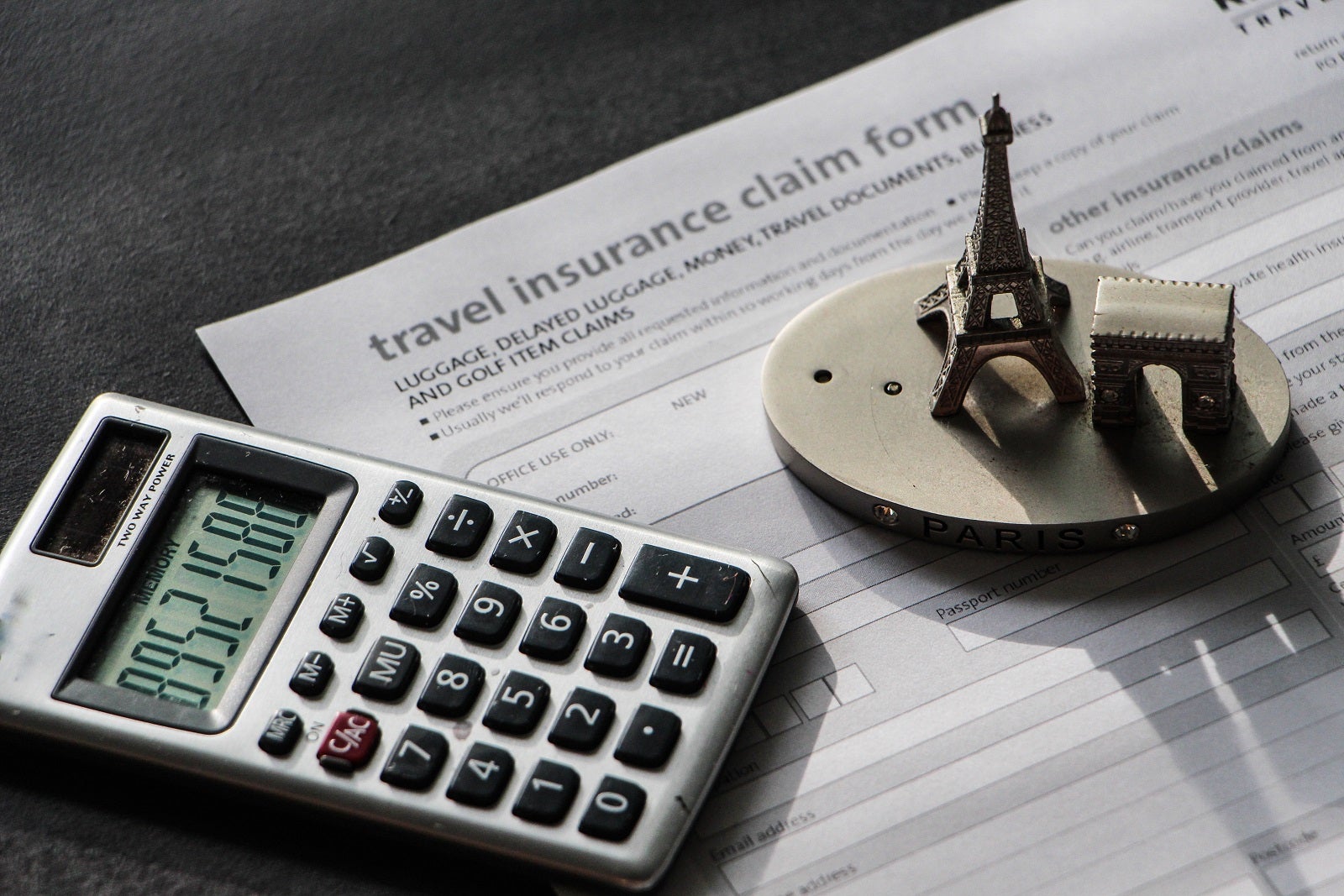
The Points Guy recommends the following travel insurance providers , all of which sell annual or semi-annual policies:
- Allianz Travel Insurance .
- Seven Corners .
- Travel Guard .
- World Nomads .
When should I purchase annual travel insurance?
There are several reasons why annual travel insurance might be better for you than separate policies for individual trips. If you travel a lot — more than two or three times annually — it could be more cost-effective than purchasing separate policies for each journey.
For me, it makes sense because I travel for a living, often taking a dozen or more trips each year. Also, much of my travel is comped, which makes insurance more difficult to acquire. (If I haven't paid for a cruise, flight or hotel, I can't attach a dollar amount to it and, therefore, often can't insure it. I also wouldn't be able to provide purchase receipts in the event something went wrong and had to file a claim.)
Other factors to consider include your health, how adventurous your travels might be, whether you have coverage as a credit card perk and how much your travel arrangements cost versus how much coverage you can get with an annual plan versus individual policies.
Another consideration right now is COVID-19. For me, the annual plan made sense because most of Allianz's individual plans don't cover issues linked to COVID-19. However, the annual coverage I purchased does.
Other things to know about annual travel insurance policies
Here are a few additional tidbits I learned after filing a trip interruption claim under my annual travel insurance policy. Keep them in mind when deciding if an annual policy is right for you.
- Before committing to the purchase of any travel insurance plan, make sure to inquire about specific components that are important to you. For me, those were COVID-19 coverage, trip interruption benefits and medevac coverage.
- Know that your coverage does not reset each time you travel when you opt for an annual policy. So, if you have a trip that goes awry, you file a claim and you max out the benefit allowed by your plan, you won't have that benefit available to you for the remainder of your policy year.
- Depending on your policy, you might have to return home between travel sessions in order for each trip to be covered. Taking several back-to-back trips could prevent them from qualifying for coverage under your annual insurance plan, so be sure to read the fine print, and plan accordingly.
- If you purchase annual or multi-trip travel insurance, keep your policy card and provider phone number with the other important documents you bring when you travel so they're easily accessible in a pinch.
- If you find yourself in a covered situation for which you'd like to seek reimbursement, keep all receipts and take photos that will help to support your claims when they're submitted.
- Don't assume all your expenses will be reimbursed, even if you think they'll be covered. It doesn't hurt to try, but in my case, my Allianz plan only partially covered the hotel expenses I submitted.
- Credit cards
- View all credit cards
- Banking guide
- Loans guide
- Insurance guide
- Personal finance
- View all personal finance
- Small business
- Small business guide
- View all taxes
You’re our first priority. Every time.
We believe everyone should be able to make financial decisions with confidence. And while our site doesn’t feature every company or financial product available on the market, we’re proud that the guidance we offer, the information we provide and the tools we create are objective, independent, straightforward — and free.
So how do we make money? Our partners compensate us. This may influence which products we review and write about (and where those products appear on the site), but it in no way affects our recommendations or advice, which are grounded in thousands of hours of research. Our partners cannot pay us to guarantee favorable reviews of their products or services. Here is a list of our partners .
How Does Travel Insurance Work?

Many or all of the products featured here are from our partners who compensate us. This influences which products we write about and where and how the product appears on a page. However, this does not influence our evaluations. Our opinions are our own. Here is a list of our partners and here's how we make money .
While every traveler hopes for the best when going on a trip, it's possible for unexpected outcomes to ruin some or all of your vacation. Travel insurance helps in those unfortunate situations by covering the necessary expenses to get you back on the right track.
But how does travel insurance work, how do you buy coverage, and is it a good idea for your next trip? Let’s find out.
What is travel insurance?
Travel insurance protects against financial losses and other risks from unexpected events that occur when traveling. Policies cover the expenses and inconveniences incurred from delayed flights, canceled reservations, lost or delayed luggage, injuries and illness.
You can buy policies that cover one reservation, an entire trip or a specific period of time. Policies can provide protection for a single person or a whole family. Prices vary based on your age, protected items, coverage limits and duration of coverage.
You don’t always have to buy a policy out-of-pocket, though. Some travel cards include built-in travel insurance as a perk. Keep in mind, however, that these policies and their coverage limits vary widely, so it pays to be mindful of what’s covered by any given travel card.
» Learn more: How to find the best travel insurance
Types of travel insurance coverage
Now that we know what it is, how does trip insurance work? There are many types of policies and coverage levels available, depending on your budget and what risks you want to cover.
So what is travel insurance for? Typically it will cover some or all of the following situations:
Trip delay. If your flight or other transportation has delays, you’ll receive compensation to cover food, lodging and other related expenses.
Trip interruption/cancellation. When your trip is interrupted or canceled for a covered reason, it provides financial assistance to make other arrangements to continue your trip or go home early.
Baggage delay. Covers the cost of reasonable clothing, toiletries, medication and other necessary items until your bag arrives.
Lost or damaged baggage. Pays to replace lost or damaged items, including both the luggage itself and personal effects that were in the luggage.
Rental car damage. Commonly called an auto collision damage waiver, this covers the cost to repair or replace a damaged or stolen rental car. Some policies also cover the lost income of the rental to the car agency while it’s being repaired.
Injury or sickness. If you get injured or sick during your trip, this benefit pays for necessary medical care. Depending on the coverage you choose, this benefit may be primary or secondary to your existing medical insurance.
Emergency assistance and transportation. Pays to transport you to the nearest facility that offers adequate medical care to treat your illness or injury. In some cases, this may mean transporting you back to your home country.
Keep in mind that many travel insurance policies do not provide protection for COVID-related situations or pre-existing medical conditions.
» Learn more: Trip cancellation insurance explained
How to use your travel insurance
Travel insurance works like most insurance policies. You purchase coverage for a period of time to protect against certain risks. When a covered event occurs, you file a claim with the insurance company to request payment or reimbursement for financial losses.
In most cases, travel insurance covers only prepaid or non-cancelable reservations. If you are able to cancel your reservations for a full refund, you should cancel them directly with that company as soon as possible. Additionally, most travel insurance policies do not cover reservations booked with airline miles or hotel points .
When you submit a claim, you’ll need to provide documentation for your loss. For example, you should document the cause of the issue (e.g., flight delay or cancellation) and provide copies of your receipts to substantiate your claims. Since there are many different types of losses that could occur, your claims process may vary by company and type of loss.
» Learn more: How do travel insurance claims work?
How to get travel insurance coverage
For travelers interested in getting a travel insurance policy, there are three primary ways to obtain coverage — purchase a standalone policy, use travel card benefits, or add on coverage when booking a trip.
Purchase a travel insurance policy
Many companies sell travel insurance as standalone policies that vary in length from a single trip to a full year. Your policy can cover a single person or an entire family. Policies range from those that offer basic coverage to others that are very robust and cover almost every possibility. Coverage options start from around $20 per trip.
For frequent travelers, it may make sense to purchase a full year of coverage instead of buying a policy for each individual trip.
» Learn more: When you don’t need to buy travel insurance
Access via travel card benefits
Many travel cards include protections that cover issues with your flight, bags and other aspects of your trip. These protections are included at no extra charge, and their coverage levels vary from card to card. You may have travel protections from some of the travel cards that are already in your wallet.
Here's a sample of the coverage available from some popular cards:
Terms apply.
» Learn more: The best credit cards for travel insurance benefits
Get add-on protection for your trip
Some companies offer travelers the option of purchasing insurance when booking a trip. However, they are generally limited in nature and usually cover only that specific reservation.
Below is an example of an add-on policy proposed by Delta Air Lines for a flight from Los Angeles to Salt Lake City for a refundable, first-class fare.
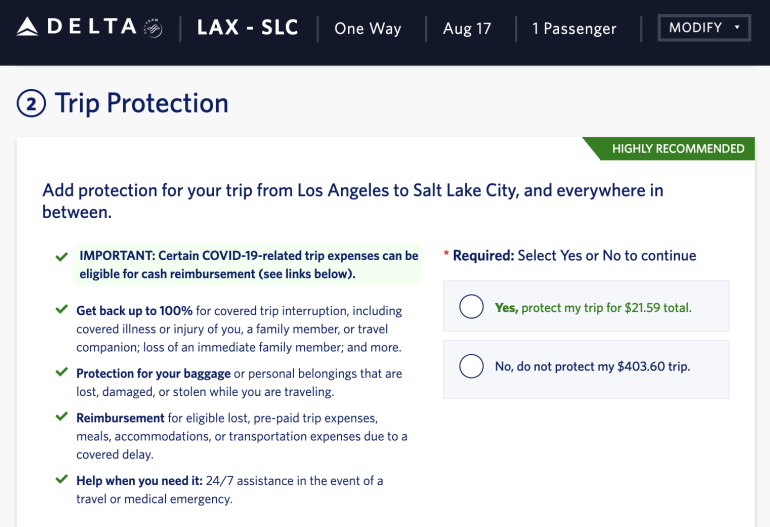
In most situations, these add-on policies only make sense for a large financial commitment, such as a cruise or a premium cabin flight. Even then, you should compare how the add-on insurance works versus buying a general policy that could cover your entire trip.
» Learn more: Airline travel insurance vs. independent travel insurance
If you’re interested in buying travel insurance
Now that we've answered "how does travel insurance work," you can see how it can be a smart way to protect your trip in case an unexpected problem occurs. Coverage limits and benefits vary by company and budget, so shop around for the best deal. Review your travel card benefits to ensure that you’re not paying for coverage that you’re already getting for free. And, if you have a claim, document everything and compile your receipts to request reimbursement right away.
How to maximize your rewards
You want a travel credit card that prioritizes what’s important to you. Here are our picks for the best travel credit cards of 2024 , including those best for:
Flexibility, point transfers and a large bonus: Chase Sapphire Preferred® Card
No annual fee: Bank of America® Travel Rewards credit card
Flat-rate travel rewards: Capital One Venture Rewards Credit Card
Bonus travel rewards and high-end perks: Chase Sapphire Reserve®
Luxury perks: The Platinum Card® from American Express
Business travelers: Ink Business Preferred® Credit Card

on Chase's website
1x-10x Earn 5x total points on flights and 10x total points on hotels and car rentals when you purchase travel through Chase Travel℠ immediately after the first $300 is spent on travel purchases annually. Earn 3x points on other travel and dining & 1 point per $1 spent on all other purchases.
75,000 Earn 75,000 bonus points after you spend $4,000 on purchases in the first 3 months from account opening. That's $1,125 toward travel when you redeem through Chase Travel℠.

1x-5x 5x on travel purchased through Chase Travel℠, 3x on dining, select streaming services and online groceries, 2x on all other travel purchases, 1x on all other purchases.
75,000 Earn 75,000 bonus points after you spend $4,000 on purchases in the first 3 months from account opening. That's over $900 when you redeem through Chase Travel℠.

1x-2x Earn 2X points on Southwest® purchases. Earn 2X points on local transit and commuting, including rideshare. Earn 2X points on internet, cable, and phone services, and select streaming. Earn 1X points on all other purchases.
50,000 Earn 50,000 bonus points after spending $1,000 on purchases in the first 3 months from account opening.

- Credit Cards
- All Credit Cards
- Find the Credit Card for You
- Best Credit Cards
- Best Rewards Credit Cards
- Best Travel Credit Cards
- Best 0% APR Credit Cards
- Best Balance Transfer Credit Cards
- Best Cash Back Credit Cards
- Best Credit Card Sign-Up Bonuses
- Best Credit Cards to Build Credit
- Best Credit Cards for Online Shopping
- Find the Best Personal Loan for You
- Best Personal Loans
- Best Debt Consolidation Loans
- Best Loans to Refinance Credit Card Debt
- Best Loans with Fast Funding
- Best Small Personal Loans
- Best Large Personal Loans
- Best Personal Loans to Apply Online
- Best Student Loan Refinance
- Best Car Loans
- All Banking
- Find the Savings Account for You
- Best High Yield Savings Accounts
- Best Big Bank Savings Accounts
- Best Big Bank Checking Accounts
- Best No Fee Checking Accounts
- No Overdraft Fee Checking Accounts
- Best Checking Account Bonuses
- Best Money Market Accounts
- Best Credit Unions
- All Mortgages
- Best Mortgages
- Best Mortgages for Small Down Payment
- Best Mortgages for No Down Payment
- Best Mortgages for Average Credit Score
- Best Mortgages No Origination Fee
- Adjustable Rate Mortgages
- Affording a Mortgage
- All Insurance
- Best Life Insurance
- Best Life Insurance for Seniors
- Best Homeowners Insurance
- Best Renters Insurance
- Best Car Insurance
- Best Pet Insurance
- Best Boat Insurance
- Best Motorcycle Insurance
- Best Travel Insurance
- Event Ticket Insurance
- Small Business
- All Small Business
- Best Small Business Savings Accounts
- Best Small Business Checking Accounts
- Best Credit Cards for Small Business
- Best Small Business Loans
- Best Tax Software for Small Business
- Personal Finance
- All Personal Finance
- Best Budgeting Apps
- Best Expense Tracker Apps
- Best Money Transfer Apps
- Best Resale Apps and Sites
- Buy Now Pay Later (BNPL) Apps
- Best Debt Relief
- Credit Monitoring
- All Credit Monitoring
- Best Credit Monitoring Services
- Best Identity Theft Protection
- How to Boost Your Credit Score
- Best Credit Repair Companies
- Filing For Free
- Best Tax Software
- Best Tax Software for Small Businesses
- Tax Refunds
- Tax Brackets
- Taxes By State
- Tax Payment Plans
- Help for Low Credit Scores
- All Help for Low Credit Scores
- Best Credit Cards for Bad Credit
- Best Personal Loans for Bad Credit
- Best Debt Consolidation Loans for Bad Credit
- Personal Loans if You Don't Have Credit
- Best Credit Cards for Building Credit
- Personal Loans for 580 Credit Score Lower
- Personal Loans for 670 Credit Score or Lower
- Best Mortgages for Bad Credit
- Best Hardship Loans
- All Investing
- Best IRA Accounts
- Best Roth IRA Accounts
- Best Investing Apps
- Best Free Stock Trading Platforms
- Best Robo-Advisors
- Index Funds
- Mutual Funds
- Home & Kitchen
- Gift Guides
- Deals & Sales
- Pet Week 2024
- Sign up for the CNBC Select Newsletter
- Subscribe to CNBC PRO
- Privacy Policy
- Your Privacy Choices
- Terms Of Service
- CNBC Sitemap
Follow Select
Our top picks of timely offers from our partners

Is travel insurance worth it?
The right policy can protect your belongings, your bank account and your peace of mind..

Terms apply to American Express benefits and offers. Visit americanexpress.com to learn more.
On April 24, 2024, the White House established new rules for airlines , mandating automatic and timely refunds for passengers whose flights had been changed, delayed or canceled. That's a big relief to travelers, but there are still many unexpected situations where travel insurance can be a lifesaver before or during your trip.
"Travel insurance is often an overlooked investment until the unforeseen happens," says Beth Godlin, president of Aon Affinity Travel Practice . "It's designed to give travelers peace of mind and financial protection against travel risks."
A policy doesn't have to be expensive, according to Godlin, to add a layer of protection and security.
Getting travel insurance
How do i get travel insurance, what does travel insurance cover.
- New airline regulations in 2024
How much does travel insurance cost?
- Bottom line
There are many options in the travel insurance marketplace: Aggregator site Squaremouth lets you get price quotes from different carriers and, because it receives a commission from the insurance companies on its site, users aren't charged any additional fees.
Allianz has both single-trip and annual plans, with a Cancel For Any Reason (CFAR) policy that reimburses up to 80% of prepaid, non-refundable expenses. That's more than most similar plans on the market.
In addition to trip cancellation, Allianz's popular OneTrip Prime plan includes travel interruption, emergency medical care and emergency transportation. Children 17 and under are covered for free when traveling with a parent or grandparent.
AIG's Travel Guard® plans are great if you need to customize coverage: The mid-range Travel Guard Preferred plan pays out 100% for trip cancellation and 150% for trip interruption, with up to $50,000 in coverage for medical expenses and up to $500,000 for emergency evacuation. There's even a payout of up to $1,000 if you miss your connection.
Travel Guard® Travel Insurance
The best way to estimate your costs is to request a quote
Policy highlights
Travel Guard offers a variety of plans to suit travel ranging from road trips to long cruises. For air travelers, Travel Guard can help assist with tracking baggage or covering lost or delayed baggage.
24/7 assistance available
If you're booking a trip with an aggregator site like Expedia , review the details of any travel policy that's offered. Plans are usually based on the elements of the trip (hotel, flight, rental car, etc.) and can differ every time you book.
Travel insurance generally covers your expenses, your belongings and your well-being. When shopping for a policy, look for these benefits:
Trip cancellation
If your trip is canceled for a covered reason, a policy will often reimburse airline tickets, hotel rooms, rental cars, tours, cruises and other prepaid, non-refundable expenses. Covered situations can include illness or injury, the death of a family member or traveling companion, job loss, military deployment and even unplanned jury duty, according to Allianz's Daniel Durazo.
Cancellations can also be covered if a natural disaster, severe weather or airline strike prevents your carrier from getting you to your destination for at least 24 hours.
CFAR plans provide a lot more flexibility and typically reimburse 50% to 75% of your expenses. But they can bump up the cost by about 40%, said Durazo. Policyholders are also still usually required to cancel no later than 48 hours before their scheduled departure.
Trip delay
Should you experience a hiccup in your plans, your policy can provide some relief: Food, lodging and local transportation are usually covered if a delay is due to severe weather, airline maintenance or civil unrest.
"For a traveler to be eligible, they must be delayed for the minimum amount of time listed on their policy," said Squaremouth spokesperson Megan Moncrief. "Some policies are very lenient and provide benefits for any length delay, while others list a length requirement — usually somewhere between three to 12 hours."
Daily payout limits range from $150 to $250 per traveler, according to Moncrief, while the total policy limit can be anywhere from $500 to $2,000. Save any receipts to submit with your reimbursement claim.
Don't miss: The best credit cards with trip delay insurance
Trip interruption
Should you need to cut your trip short due to illness or injury, or if there's a family emergency back home, your policy may reimburse non-refundable expenses you forfeited.
It may also cover the cost of a one-way economy airline ticket home.
Baggage loss
Airlines are required to compensate passengers for luggage lost in transit, but a travel insurance policy may have a higher benefit limit. It could also cover you if your bags, passport or other possessions are lost, damaged or stolen once you've gotten to your destination., The Platinum plan from AXA Assistance USA has a $3,000 benefit limit for lost luggage, well beyond the $1,700 that airlines are required to provide on international flights. AXA has offices in more than 50 countries, with multilingual operators available 24 hours a day to help reschedule flights, book hotels and make other arrangements.
AXA Assistance USA Travel Insurance
AXA Assistance USA offers several travel insurance policies that include travel interruption, trip cancellation, and the option of cancel for any reason (CFAR) coverage.
Travel insurance doesn't cover every loss: Cash is not reimbursable and many policies won't reimburse for expensive jewelry or heirloom items. Read your policy carefully to see what is included.
Medical expenses and emergency evacuation
If you travel within the U.S., your health insurance should cover any illness or injury you sustain. If you're traveling abroad, though, your plan may provide little or no coverage. The right travel insurance should cover doctors' fees and hospital bills, Durazo said.
The provider can also help coordinate care and ensure you're at a medical facility that's up to U.S. standards.
An emergency medical evacuation can cost anywhere from $15,000 to over $200,000, Durazo added.
New airline regulations in April 2024
The Biden administration announced on April 24, 2024 , that it had finalized new rules requiring airlines to issue cash refunds to passengers if their flights were canceled or significantly changed, their checked luggage was significantly delayed or if purchased services, like Wi-Fi, were not provided.
Refunds must be automatic and made via the same form of payment as the original purchase. Travelers must be reimbursed within seven business days if the refund is going to a credit card. (Other forms of payment can take 20 calendar days to be reimbursed.) The new Department of Transportation regulations also require airlines and ticket agents to disclose upfront any fees for changing or canceling your reservation, seat selection, checked bags or carry-ons. The Biden administration has targeted junk fees across numerous industries, including credit card companies. It said the rule will help consumers avoid unneeded or surprise charges that can quickly add up and obscure the real cost of a seemingly inexpensive ticket.
A travel insurance policy typically costs between 4 and 10% of the overall price of your trip. The cost can vary:
- Plans with higher limits and more optional coverage cost more.
- A plan with a CFAR benefit can cost up to 40% more.
- Older travelers typically pay more because there's more of a likelihood of a claim being filed.
Whichever plan you choose, read the fine print so you understand what you're paying for.
While regulations on airlines are becoming increasingly stringent about reimbursing travelers for delayed or canceled flights, that doesn't do you any good if it wasn't the airline that put a kink in your plans. Travel insurance covers numerous scenarios, from medical emergencies to tropical storms. It could be particularly useful if:
- You've spent a lot on prepaid, non-refundable expenses
- You're traveling internationally where your health insurance won't apply
- You're traveling to a remote area
- Your flight involves multiple connections or destinations
"When deciding if travel insurance is right for you, ask yourself how much you could stand to lose if you had to cancel at the last minute," said Godlin.
If you're not as concerned about risk, your credit card may offer built-in travel protection if you book with that card: Chase Sapphire Preferred® , Southwest Rapid Rewards® Plus Card and the *American Express® Gold Card all come with trip cancellation and interruption coverage, among other benefits.
*Eligibility and benefit level varies by card. Terms, conditions and limitations apply. Please visit americanexpress.com/benefitsguide for more details. Underwritten by New Hampshire Insurance Company, an AIG Company.
Chase Sapphire Reserve®
Earn 5X total points on flights and 10X total points on hotels and car rentals when you purchase travel through Chase Travel℠ immediately after the first $300 is spent on travel purchases annually. Earn 3X points on other travel and dining & 1 point per $1 spent on all other purchases plus, 10X points on Lyft rides through March 2025
Welcome bonus
Earn 75,000 bonus points after you spend $4,000 on purchases in the first 3 months from account opening. That's $1,125 toward travel when you redeem through Chase Travel℠.
Regular APR
22.49% - 29.49% variable
Balance transfer fee
5%, minimum $5
Foreign transaction fee
Credit needed.
Terms apply.
Read our Chase Sapphire Reserve® review.
Southwest Rapid Rewards® Plus Credit Card
Earn 2X points on Southwest® purchases, 2X points on local transit and commuting, including rideshare; 2X points on internet, cable and phone services; select streaming. 1X points on all other purchases
Earn 50,000 bonus points after spending $1,000 on purchases in the first 3 months from account opening.
21.49% - 28.49% variable
Foreign transaction fees
Excellent/Good
American Express® Gold Card
4X Membership Rewards® points at Restaurants (plus takeout and delivery in the U.S.) and at U.S. supermarkets (on up to $25,000 per calendar year in purchases, then 1X), 3X points on flights booked directly with airlines or on amextravel.com, 1X points on all other purchases
Earn 60,000 Membership Rewards® points after you spend $6,000 on eligible purchases with your new Card within the first 6 months of Card Membership.
Not applicable
See Pay Over Time APR
See rates and fees , terms apply.
Read our American Express® Gold Card review .
Research your card's travel benefits before making any purchases related to your trip.
Policies vary, but most comprehensive plans cover travel cancellation and interruption, baggage loss, medical care and emergency transportation.
While the price for coverage varies, most policies cost between 4% and 10% of the trip's prepaid, non-refundable expenses.
When should I get travel insurance?
It's best to take out a policy within days of making your reservations.
Does travel insurance cover COVID-19?
If you contract COVID-19 before or on your trip, it may be covered by your policy's trip cancellation/interruption benefit . You'll likely have to confirm your test results with a diagnosis from a healthcare provider.
Bottom line
Travel can be a wonderful experience, but it involves a lot of time, planning and money. Missing a single connection can have a cascade effect that impacts your flight, hotel room, dinner reservations and more. A good travel insurance policy can provide peace of mind so you can focus on your vacation.
Compare and find the best life insurance
Money matters — so make the most of it. Get expert tips, strategies, news and everything else you need to maximize your money, right to your inbox. Sign up here .
Meet our experts
At CNBC Select, we work with experts with specialized knowledge and authority. For this story, we interviewed Beth Godlin, president of Aon, which provides custom travel insurance for tour operators, cruise lines, travel websites and others. We also spoke with former Squaremouth Megan Moncrief and Allianz communications director Daniel Durazo.
Why trust CNBC Select?
At CNBC Select, our mission is to provide our readers with high-quality service journalism and comprehensive consumer advice so they can make informed decisions with their money. Every insurance article is based on rigorous reporting by our team of expert writers and editors . While CNBC Select earns a commission from affiliate partners on many offers and links, we create all our content without input from our commercial team or any outside third parties, and we pride ourselves on our journalistic standards and ethics.
Catch up on CNBC Select's in-depth coverage of credit cards , banking and money , and follow us on TikTok , Facebook , Instagram and Twitter to stay up to date.
For rates and fees for the American Express® Gold Card , click here .

- First-time homebuyer grants: What you need to know Kelsey Neubauer
- Earn elevated perks during Amex's Platinum Card anniversary celebration Andreina Rodriguez
- How to use the Chase Sapphire Preferred hotel credit Jason Stauffer
- Travel Agents
- Agent Login/Dashboard
- Travel Insurance Plans
- Travel Medical Insurance
- Group Travel Insurance
- Agent Plans
- Supplier Plans
- Consumer Notices
- Insurance Plan Documents
- How Does Travel Insurance Work
- When To Buy
- What Our Travel Insurance Can Cover
- Why Choose TravelSafe?
- TravelSafe FAQ
- Travel Tips
- Report a Claim
- View Claim Status
- Documentation
What is Travel Insurance & How Does it Work? 11 Questions Answered
Travel insurance is a valuable way to limit the risks associated with travel, deserving of consideration by every traveler. Despite its many benefits, there remains a great deal of confusion, and even skepticism, surrounding travel insurance .
Perhaps the perceived complexity of travel insurance plans and our reluctance to prepare for worst-case scenarios prevents us from discovering the many benefits of travel insurance. However, equipped with the proper information, you can choose the best plan for your trip and simplify the decision-making process.
From questions regarding pre-existing medical conditions to choosing the right plan, here are answers to 11 common travel insurance questions.
1. WHAT IS TRAVEL INSURANCE EXACTLY ?
Travel insurance is a contract between a travel insurance provider and a traveler who has financial interest in lessening risks associated with travel.
The traveler pays a premium to a travel insurance company in exchange for coverage for things like unexpected medical costs, flight delays, cancellations, evacuations, and emergency assistance. Depending on which plan you choose, coverage will vary.
2. WILL TRAVEL INSURANCE COMPANIES TRY TO CHEAT ME OUT OF WHAT IS OWED TO ME?
No. Travel insurance companies strive to pay every legitimate claim covered by your policy’s terms. Understanding your plan is always helpful because it avoids confusion as to what is covered during your trip or the claims process.
Be sure to take advantage of your plan's review period. Each travel insurance plan comes with an industry-wide review period, which allows you to look over your policy, ask questions, and determine whether the coverage works for you. If you believe the plan you purchased is not to your liking, you are able to cancel the policy in exchange for a full refund during this time.
3. IS IT JUST A FANCY VERSION OF HEALTH INSURANCE?
No, it is not a fancy version of your health insurance plan. In order to receive coverage, a qualified physician must deem treatment medically necessary. Routine doctor’s visits, medical tourism, prescription refills, and standard health assessments are not covered within plan benefits.
An added benefit to travel insurance: it can offer emergency medical and dental treatment during your trip without the strict network limitations of several PPO and HMO plans.
4. I AM ALREADY BEING TREATED FOR AN ILLNESS. WILL I BE COVERED?
Possibly. One company may provide coverage while others will not. Most companies who offer coverage for pre-existing medical conditions have eligibility requirements.
This coverage usually requires purchase at deposit or within 7-21 days from the date you made the first payment on your trip. Additionally, your doctor must have cleared you to travel at the time you purchased your policy.
Expert Tip: Many policies offered by cruise lines, tour operators, and airlines do not cover pre-existing medical conditions.
Are your pre-existing conditions covered?
Take a peek at our coverage & find out. Get a quote today.

5. DO PRE-EXISTING CONDITIONS APPLY TO NON-TRAVELING FAMILY MEMBERS?
It will depend on the company and plan you choose. There are travel insurance companies who only apply pre-existing conditions to policyholders and traveling companions.
In contrast, you have to have pre-existing conditions waived for some plans and others will not cover you for the pre-existing conditions of your non-traveling family members.
6. MY CREDIT CARD SAYS THEY OFFER TRAVEL INSURANCE. ISN’T THAT ALL I NEED?
Not unless you carry an American Express Centurion card, which is exclusively for big spenders, invite only, and has a steep initiation fee of $5,000.
The truth is, even the best credit cards offer limited coverage. Low benefit limits and a long list of exclusions can leave you with a costly bill for things you could have had covered otherwise.
7. HOW DOES TRAVEL INSURANCE WORK? WILL I RECEIVE AN INSURANCE CARD IN THE MAIL?
You will not receive an insurance card in the mail. Instead, travel insurance companies send you a brief description of coverage with your emergency assistance contact information via email (it can be mailed upon request).
Smaller costs are often paid out of pocket, and you file for reimbursement later on. Larger catastrophic costs are handled by the travel insurance and emergency assistance company.
For example, both payment and planning would be handled by the travel insurance and assistance companies for a hospital stay or medical evacuation.
8. WHAT ARE THE DIFFERENT KINDS OF TRAVEL INSURANCE?
There are two main types of travel insurance: medical only and packaged plans, or comprehensive travel insurance. Both have long-term and short-term travel options, and the type of plan you choose will depend on your needs.
Medical only plans offer coverage for the costs of necessary medical care, medical evacuations, and sometimes, repatriation. These plans are often used by expatriates or student travelers living overseas. Return dates are not always set, so the option for renewal works out well for them.
Packaged plans offer coverage for you, your things, and your travel investment. Necessary medical costs are usually covered, along with things like medical evacauations, non-medical evacuations, flight delays, cancellation, and lost or stolen baggage .
9. WHAT IS NOT COVERED BY TRAVEL INSURANCE?
Things the insurance company lists as exclusions. Exclusions are defined within your travel insurance plan and are always predetermined. They exist so you know what is and is not covered up front.
Here is what you would typically see as an exclusion:
- An act of war.
- Riding or driving races, or speed or endurance competitions or events.
- Participating in a professional stunt.
- Being intoxicated or under the influence of any controlled substance, unless as administered by a legally qualified physician.
While policy exclusions vary by plan, travel insurance companies agree on one thing: anything foreseen is not covered. In other words, if you know about it ahead of time, you do not have coverage. You cannot buy coverage for a hurricane that is already named or a terrorist incident that happened yesterday.
10. HOW OFTEN IS TRAVEL INSURANCE USED SUCCESSFULLY?
According to the U.S. Travel Insurance Association , in 2014, 85% of impacted travelers who had travel insurance said they were satisfied with their purchase.
Here are real claims told by travelers:
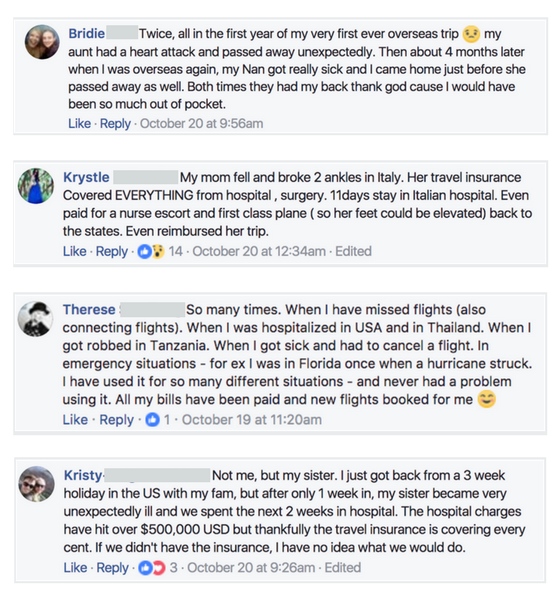
11. HOW DO I KNOW IF I AM CHOOSING THE RIGHT PLAN FOR MY TRIP?
By asking yourself the right questions. It will help you effectively choose a plan that fits your needs.
Some questions you should ask are:
- How long is my trip?
- How often do I travel?
- How much of my prepaid trip costs am I willing or able to lose?
- Will I be partaking in extreme sports?
- What are the plan features?
- What are the risks associated with my trip?
- What are the costs associated with these risks?
- If faced with travel mishaps, which risks would I need help lessening?
1. " Americans Spending More on Travel Insurance ." Press Release. www.ustia.org . July 14th, 2017.

Subscribe to Our Blog
- Agent Login
- Privacy Policy
- Terms & Conditions
- Return Policy & Guarantee
June 1, 2020
Due to travel restrictions, plans are only available with travel dates on or after
Due to travel restrictions, plans are only available with effective start dates on or after
Ukraine; Belarus; Moldova; North Korea; Russia; Israel
This is a test environment. Please proceed to AllianzTravelInsurance.com and remove all bookmarks or references to this site.

Use this tool to calculate all purchases like ski-lift passes, show tickets, or even rental equipment.

The Comprehensive Guide to Annual Travel Insurance

Who Should Buy Annual Travel Insurance?
Older travelers: Here’s a secret many travelers don’t realize: Annual travel insurance is an especially good deal for people 65 and up. That’s because, unlike single-trip insurance plans, the cost of multi-trip plans is not affected by the traveler’s age. A 71-year-old traveler will pay the same as a 41-year-old traveler.
> Read more: What Factors Affect the Cost of Travel Insurance?
Business travelers: Your friends think your on-the-go life is glamorous. You know the truth: business travel is a grind. The AllTrips Executive plan helps you bounce back when things go wrong by reimbursing your expenses for covered travel delays, misplaced luggage, and even lost or damaged business equipment.
Spontaneous travelers: People with flexible schedules can score savings on last-minute cruises and hotel stays. But travel deals like these often have strict cancellation policies, making travel insurance all the more important. A multi-trip plan automatically protects your trip as soon as you book it.
Road trippers: Because road trips tend to have few pre-paid expenses, people don’t bother to insure them. But travel delays, trip interruptions and medical emergencies can still wreck your plans — what then? An annual travel insurance plan protects you from those unexpected speed bumps.
Budget travelers: If you’re careful with your travel spending, then an AllTrips plan is a must. The expense is minimal, especially if you’re planning several trips. And travel insurance can protect you from unexpected expenses when you’re dealing with a medical emergency, lost bag, travel delay or other mishap.
Parents and grandparents: Did you know you can give an AllTrips plan as a gift ? If your child or grandchild is an avid traveler, an annual insurance plan will accompany them everywhere they go, helping them when things don’t go as planned. You’ll enjoy more peace of mind, too.
Which Benefits Are Included in Annual Travel Insurance?
Every AllTrips plan includes the following benefits:
- Emergency medical benefits , to reimburse you for covered medical expenses in case of a covered illness or injury
- Emergency transportation benefits , in case you require a medically necessary evacuation for a covered illness or injury
- Baggage loss/damage benefits , in case your bags are stolen, or damaged or misplaced by your travel carrier
- Baggage delay benefits to reimburse you for necessary, eligible purchases when your bags are delayed
- Travel delay benefits to reimburse you for eligible meals, accommodations and other covered expenses during a covered delay
- Rental car damage and theft coverage . (Rental car coverage, when purchased as part of an annual plan, is not available for residents of all states.)
- Travel accident benefits, which can pay you for covered losses due to death, loss of limb(s) or sight as a result of a covered travel accident
- Access to 24-Hour Hotline Assistance , so you can get expert help dealing with travel emergencies
- Concierge assistance to help with travel planning and arranging special experiences
Some AllTrips plans also include:
- Trip cancellation benefits , to reimburse your prepaid, non-refundable expenses if you have to cancel your trip due to a covered reason.
- Trip interruption benefits , to reimburse you for the unused, non-refundable portion of your trip and for the increased transportation costs it takes for you to return home due to a covered reason.
- Business equipment coverage, to reimburse the repair, replacement and/or rental of business equipment that has been lost, stolen, damaged or delayed by your common carrier.
- Change fee coverage , to reimburse fees if you change the dates on your airline ticket for a covered reason.
- Loyalty program redeposit fee coverage, which reimburses fees charged for re-depositing loyalty program awards (such as frequent flyer miles) back into your account following a covered trip cancellation or interruption.
What’s the Best Annual Travel Insurance Plan?
Allianz Global Assistance offers four annual travel insurance plans. All of them include our award-winning 24-Hour Assistance services , which can help you find solutions to tough travel problems.
AllTrips Basic is the most economical multi-trip plan offered by Allianz Global Assistance. It includes post-departure benefits to protect you in case of baggage loss/damage/theft, travel delays, covered medical emergencies and more. It does not protect your travel investment with trip cancellation/trip interruption benefits.
AllTrips Prime includes all the benefits (with the same maximum limits) as AllTrips Basic, with the addition of trip cancellation and trip interruption benefits. There’s a limit of $3,000 for trip cancellation and trip interruption per person, per year .
AllTrips Executive can protect business, pleasure and blended trips, with multiple tiers of coverage for trip cancellation and interruption up to $10,000. If your business equipment is lost, stolen, damaged or delayed by an airline or other carriers, this plan can reimburse reasonable costs for equipment rental, replacement and/or repair.
AllTrips Premier can protect your entire household while you’re traveling. It offers four tiers of trip cancellation/trip interruption benefits, up to $15,000 per household, per trip, per year.
> Read more: Which Annual Travel Insurance Plan is Right for You?
Tips for Buying Annual Travel Insurance
An alltrips plan protects trips within a 365-day span (not a calendar year)..
It’s wise to look ahead at your travel plans to make sure your trips will be protected. Your AllTrips plan takes effect at 12:01 a.m. on the day after we receive both your order and full premium payment (or on a future date you choose at the time of purchase). It ends at 11:59 p.m. local time on your coverage end date, unless you are on a trip. If you are on a trip, your coverage will end on the day you arrive at your point of origin or primary residence, or seven days after the coverage end date, whichever is earlier.
Trip cancellation and interruption benefit limits are per person, per year.
This is key! Each benefit in your AllTrips plan has a maximum dollar limit, depending on which plan you choose. For example, AllTrips Prime has a maximum limit of $20,000 in emergency medical benefits per insured person, per trip . So, if you incur $20,000 in emergency medical costs from a car accident while in Romania, and then another $20,000 in emergency medical costs from a hippopotamus attack on a trip to Botswana (bad luck!), both claims could be covered.
Trip cancellation/interruption is different: The maximum limit applies per person, per year . AllTrips Prime’s maximum trip cancellation benefit is $3,000. So, if you file a claim for $2,000 after canceling your Jamaican vacation, you only have $1,000 left to cover any other trip cancellations for the duration of your plan. Keep your total trip costs in mind when you’re choosing a plan.
AllTrips plans can cover losses resulting from pre-existing conditions.
We define a pre-existing medical condition as injury, illness, or medical condition that, within the 120 days prior to and including the policy purchase date:
- Caused a person to seek medical examination, diagnosis, care, or treatment by a doctor;
- Presented symptoms; or
- Required a person to take medication prescribed by a doctor (unless the condition or symptoms are controlled by that prescription, and the prescription has not changed).
With an AllTrips plan, you can be covered for losses due to a pre-existing medical condition if you were a U.S. resident when the policy was purchased and:
a. The trip was purchased during the coverage period; or
b. Your policy was purchased within 14 days of the date of the first trip payment or deposit.
Please read your plan documents for details.
Some trips may not be eligible for travel protection.
While there’s no limit on how many trips you take, most of our AllTrips plans have a 45-day limit on trip length. If you’re planning a longer journey, consider AllTrips Premier , a multi-trip plan that can protect trips up to 90 days, or OneTrip Emergency Medical , a low-cost single-trip plan that can protect trips up to 180 days in length. Also, travel insurance plans do not cover travel with the intent to receive health care or medical treatment of any kind, moving, or commuting to and from work.
Look at your options for protecting the whole family.
If your family is taking multiple trips together in the next 12 months, AllTrips Premier may be your best choice, because it can cover your entire household. But if you’re planning only one big family vacation, then you might opt for the single-trip OneTrip Prime or OneTrip Premier plan . Both cover kids 17 and under for free when they’re traveling with a parent or grandparent (not available on policies issued to Pennsylvania residents).
Read your plan documents before you travel.
Travel insurance can do a lot, but it can’t cover every possible situation. Take some time to read your annual plan documents so you understand which situations, events, and losses can be covered, and which aren’t.
> Read more: Travel Insurance 101: How Travel Insurance Works
The free Allyz ® TravelSmart app is the easiest way to access your benefits when you’re traveling.
Allyz TravelSmart , available for iOS and Android, helps you contact Assistance, file a claim, get travel alerts and flight updates, find pre-screened medical facilities and more.
Related Articles
- The Comprehensive Guide to Travel Insurance Benefits
- Why an Annual Travel Insurance Plan is a Smart Move for Domestic Trips
- Why I Finally Bought Annual Travel Insurance (And Why You Should Too)

Get a Quote
{{travelBanText}} {{travelBanDateFormatted}}.
{{annualTravelBanText}} {{travelBanDateFormatted}}.
If your trip involves multiple destinations, please enter the destination where you’ll be spending the most time. It is not required to list all destinations on your policy.
Age of Traveler
Ages: {{quote.travelers_ages}}
If you were referred by a travel agent, enter the ACCAM number provided by your agent.
Travel Dates
{{quote.travel_dates ? quote.travel_dates : "Departure - Return" | formatDates}}
Plan Start Date
{{quote.start_date ? quote.start_date : "Date"}}
Share this Page
- {{errorMsgSendSocialEmail}}
Your browser does not support iframes.
Popular Travel Insurance Plans
- Annual Travel Insurance
- Cruise Insurance
- Domestic Travel Insurance
- International Travel Insurance
- Rental Car Insurance
View all of our travel insurance products
Terms, conditions, and exclusions apply. Please see your plan for full details. Benefits/Coverage may vary by state, and sublimits may apply.

Insurance benefits underwritten by BCS Insurance Company (OH, Administrative Office: 2 Mid America Plaza, Suite 200, Oakbrook Terrace, IL 60181), rated “A” (Excellent) by A.M. Best Co., under BCS Form No. 52.201 series or 52.401 series, or Jefferson Insurance Company (NY, Administrative Office: 9950 Mayland Drive, Richmond, VA 23233), rated “A+” (Superior) by A.M. Best Co., under Jefferson Form No. 101-C series or 101-P series, depending on your state of residence and plan chosen. A+ (Superior) and A (Excellent) are the 2nd and 3rd highest, respectively, of A.M. Best's 13 Financial Strength Ratings. Plans only available to U.S. residents and may not be available in all jurisdictions. Allianz Global Assistance and Allianz Travel Insurance are marks of AGA Service Company dba Allianz Global Assistance or its affiliates. Allianz Travel Insurance products are distributed by Allianz Global Assistance, the licensed producer and administrator of these plans and an affiliate of Jefferson Insurance Company. The insured shall not receive any special benefit or advantage due to the affiliation between AGA Service Company and Jefferson Insurance Company. Plans include insurance benefits and assistance services. Any Non-Insurance Assistance services purchased are provided through AGA Service Company. Except as expressly provided under your plan, you are responsible for charges you incur from third parties. Contact AGA Service Company at 800-284-8300 or 9950 Mayland Drive, Richmond, VA 23233 or [email protected] .

Return To Log In
Your session has expired. We are redirecting you to our sign-in page.

Personal Finance
What is travel insurance.
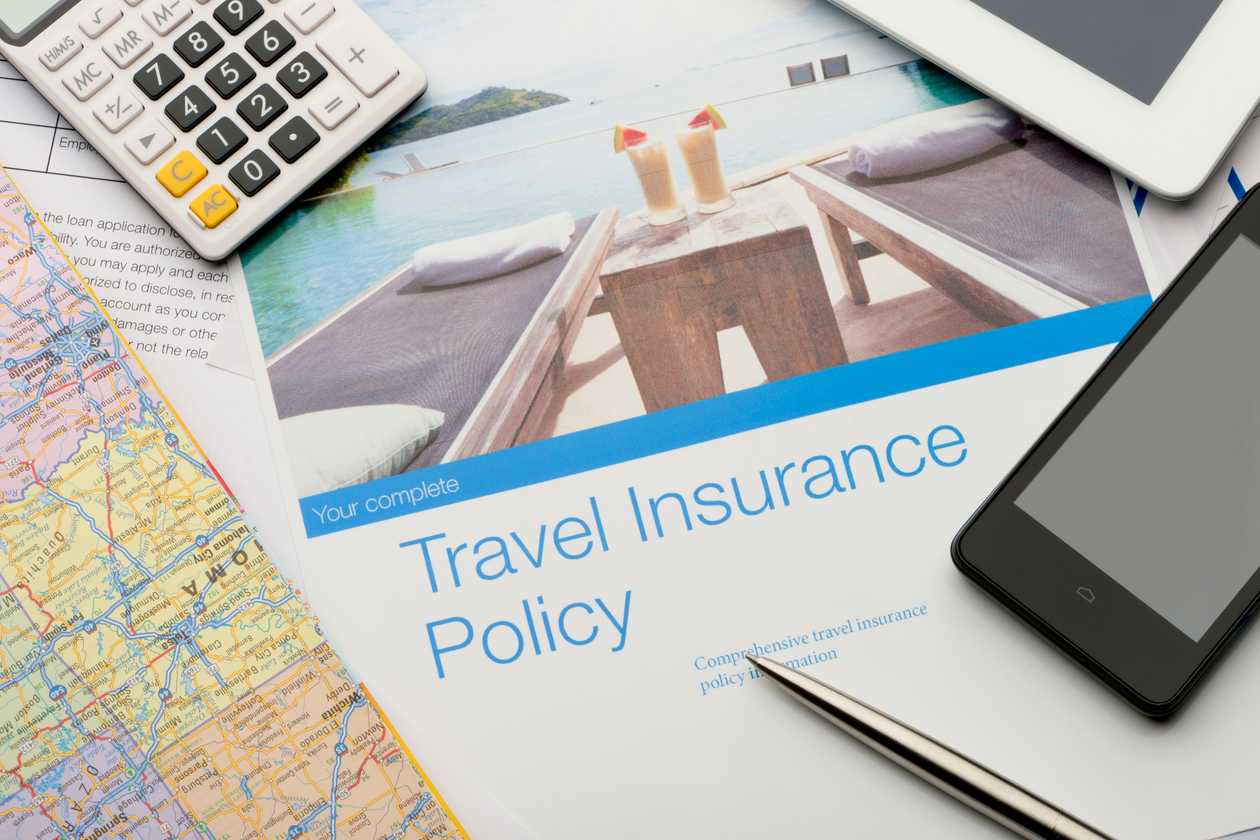
Our evaluations and opinions are not influenced by our advertising relationships, but we may earn a commission from our partners’ links. This content is created independently from TIME’s editorial staff. Learn more about it.
Travel insurance can cover financial losses due to unforeseen setbacks both before you depart and during a trip. These include trip cancellation, travel delays and interruption, medical emergencies, medical evacuations, and loss of luggage. In general, travel insurance policies are good for U.S. and international travel and usually cost between 4% to 8% of the total trip price.

Travelex Travel Insurance
Policy cancellation, how does travel insurance work.
Travel insurance works in the same manner as other kinds of insurance policies, such as plans to protect a home, car, or other valuable assets like jewelry. Travel insurance plans protect certain prepaid, nonrefundable, trip-related costs that could be at risk in the case of an unexpected issue. Among them: a delayed flight that causes you to miss a cruise, an injury that causes your trip to be cut short, or an airline losing your luggage.
Should you get travel insurance?
The decision to purchase a travel insurance plan is closely connected to the traveler’s risk tolerance, the value of their trip, and the potential for certain circumstances to arise that could cause disruptions to their travel plans, says Rhonda Sloan , head of marketing and travel industry relations at AIG Travel.
“For example, a cruise that cost $15,000 would be an investment that many would consider worth protecting, particularly if there could be issues that put prepaid, nonrefundable trip costs at risk,” says Sloan. “For more expensive trips or those that take a traveler farther from home, a travel insurance plan might be on their radar, as the chances of lost luggage, canceled or delayed flights, injuries related to trip activities, or other travel mishaps are greater.”
Travel insurance types
Most travel insurance plans include some coverage for trip cancellation, trip interruption, trip delay, medical expenses, emergency medical evacuation, and lost luggage. AIG Travel, for example, offers three levels of its basic travel insurance plans for standalone trips— Deluxe, Preferred and Essential — that provide varying levels of coverage limits. Also, travel insurers offer optional travel insurance plan upgrades, known as “bundles,” that augment your policy with customized travel insurance plan packages tailored to your specific travel needs.
One of the most popular reasons people buy travel insurance is for trip cancellation coverage, which is a pre-departure benefit. Emergencies can happen before a scheduled trip, and your travel insurance policy will provide a list of acceptable reasons that are covered by your plan. It’s important to thoroughly read your travel insurance documents.
If the reason you’re canceling is covered under your policy, you can file a claim to receive 100% of the prepaid, nonrefundable trip deposits you would lose because you aren’t going on your trip. Typical reasons that will be covered by your trip cancellation benefits include: death, illness, or injury to you, a travel companion, or a close family member; a serious family emergency; severe weather; a sudden job loss; unplanned jury duty; your travel supplier going out of business; a national transportation strike; and a national emergency.
Not all reasons will be covered by a basic travel insurance policy. For example, fear of travel or having a fight with your travel companion before a trip are not reimbursable reasons to cancel.
If you want the highest level of flexibility regarding your travel plans, consider adding “ cancel for any reason ” coverage to your basic travel insurance plan. This add-on will boost your travel policy price by about 50%, but it will allow you the latitude to cancel for any reason, so long as you do so no later than 48 hours before your scheduled departure. If you meet all the criteria, you can expect to recover between 50% to 75% of your nonrefundable, prepaid trip outlays.
How do you choose the best insurance policy?
There is no one-size-fits-all when it comes to travel insurance. It’s up to the individual to review each policy type and determine if the benefits included fit their personal needs and concerns, says Daniel Durazo , director of external communications at Allianz Partners U.S. “How much insurance you need comes down to how much you’re willing to risk losing in the event of an unexpected cancellation or emergency situation,” he adds.”
It’s also advisable to research policy options and your destination. “Do your homework,” says Sloan. She explains that it is important for travelers to have a good understanding of their destination and the mishaps that might be common there: severe weather, petty crime, etc. “Travelers should also carefully review the details of any insurance plan they are considering to learn about coverage amounts, potential coverage exclusions, and optional policy upgrades,” says Sloan.
Aim to get an understanding of plan and coverage options, as well as the likelihood for certain mishaps at a planned destination, so you’re in a better position to choose a travel insurance plan that’s best suited for your trip.
What is covered by a standard travel insurance policy?
Most standard travel insurance policies are going to include some coverage for trip cancellation, trip interruption, trip delay, travel medical expenses, emergency medical evacuation, and benefits for lost or stolen baggage and some personal effects.
What is not covered by travel insurance?
Policy exclusions will vary by carrier and plan, so be sure to read your plan documents to understand all the exclusions and limitations.
Sloan says that travel insurance plans generally do not cover losses caused by—or resulting from—such situations as acts of war, epidemics or pandemics, travel restrictions imposed by government authorities, foreseeable events, or fear of travel.
The following items are also generally not covered by travel insurance.
- Pre-existing conditions. Although travel insurance is an excellent safeguard against many types of medical emergencies abroad—from accidents to evacuations—most policies have built-in exclusions for pre-existing conditions, says Stan Sandberg , cofounder of TravelInsurance.com. “If you’ve been seriously ill in the past or need ongoing treatment, consider looking for a plan that offers a pre-existing condition waiver ,” he says.
- Luggage in limbo. Coverage for lost luggage is common, but it usually doesn’t kick in until your bags have been missing for a set number of hours. Check your policy for waiting times, says Sandberg. “In case of a delay, it’s a good idea to carry a least a day’s worth of medication, toiletries, and clothing in your carry-on.”
- When trip cancellation rules don’t apply. As mentioned, not all reasons to receive benefits under your starter travel insurance plan will apply. “Generally, coverage extends to situations that are out of your control, including death in the family, natural disasters, unexpected work obligations, new illnesses, and injuries. In other words, you won’t be able to get your money back if you simply change your mind,” says Sandberg.
- Pregnancy and childbirth. Standard pregnancy-care expenses incurred while away won't be covered by a travel insurance plan, even if you hold a pre-existing condition waiver. Prenatal services such as routine care, ultrasounds, and medical expenses for labor and uncomplicated childbirth won’t be covered by travel insurance. The best course of planning is to speak with your medical provider to decide if travel is advisable during pregnancy. Some emergency pregnancy-related expenses may be covered by travel insurance. Also, you may be able to get special coverage for pregnancy as an add-on.
How much does travel insurance cost?
As noted above, travel insurance policies for U.S. and international travel usually cost between 4% to 8% of the total trip price.
What affects travel insurance costs?
As an example, AIG Travel’s Deluxe, Preferred, and Essential travel insurance plans are priced based on:
- Traveler’s age.
- Trip duration.
- State of residence.
How can you get travel insurance?
You can purchase travel insurance through:
- Carrier. You can buy directly from a travel insurance carrier online and answer prompts to get a quote and make a purchase. You can also call the company’s toll-free number and speak with a representative. In addition, travel advisors also offer travel insurance plans.
- Credit card. Some credit cards have travel insurance benefits, but this coverage will vary, so it’s best to check with your specific credit card issuer. There are often exclusions and limitations, so request an overview of the scope of the policy. Another important factor is that you must pay for your entire trip on the card on which you plan to file a claim.
How can you get the most out of travel insurance?
- Purchase your travel insurance plan as soon as you book your trip and take advantage of all the pre-departure benefits, such as trip-cancellation coverage.
- Look into a waiver of the exclusion for pre-existing medical conditions.
- Take advantage of all the perks included. For example, there should be travel-assistance services if you experience a travel disruption, such as a delayed flight or lost luggage. Most carriers have a 24/7 hotline that provides free help, including concierge services, translation services, and medical referrals.
What are the key travel insurance trends for 2023?
According to a report released in 2022 by Allianz the top trends are :
- Elevated levels of demand for travel insurance.
- How increased economic and geopolitical volatility are affecting travel insurance.
- Higher customer expectations regarding travel insurance and the claims process.
TIME Stamp: Travel insurance provides a valuable safety net
The nominal cost of a policy, which spans from 4% to 8 % of your trip costs, can save you thousands of dollars if you need to cancel your trip due to a covered reason in your policy, experience travel delays or interruptions, become ill or injured while away, or have your baggage or personal belongings lost or stolen while traveling.
There are also upgrades that can be purchased, such as “cancel for any reason” coverage and sports and medical bundle upgrades to starter insurance plans. Ultimately, travel insurance provides peace of mind and can protect your trip investment, health, and belongings.
Virtually all travel insurance carriers have an 800 number where representatives can answer questions. Their websites also provide very thorough descriptions of travel insurance plans to select.
Frequently asked questions (FAQs)
What are the top travel destinations for 2023 .
Based on TravelInsurance.com customer data , popular destinations for 2023 include Italy, Mexico, the United Kingdom, Jamaica, Canada, France, Ireland, Germany, the Bahamas, and Greece.
Does travel insurance get more expensive closer to the trip?
Generally, the price won’t get higher as your trip approaches. For instance, Sloan says that AIG Travel’s Deluxe, Preferred, and Essential travel insurance plans do not change in price when purchased closer to the departure date. “However, purchasing early relative to the initial deposit date has its advantages, such as a waiver of the pre-existing medical conditions exclusion,” she says.
Do I need car rental insurance when I travel outside of the United States?
Personal auto insurance policies in the U.S. may not provide coverage if you’re renting a car abroad. “Some countries require certain minimum coverage amounts or types of coverage for a vehicle rental insurance policy, so be sure to check the specifics of the country you’ll be driving in,” says Sloan.
The information presented here is created independently from the TIME editorial staff. To learn more, see our About page.
Agent Information
← Return to Blog
The Best Annual Travel Insurance and Subscriptions for Frequent Travelers
Becky Hart | Jan 30, 2024
Share Twitter share

We all love travel hacks that save us money and time. Luckily, there are three important types of services or “memberships” you can take advantage of to make travel more economical and convenient: annual plans, loyalty programs, and subscription services.
But are each of these really that different? How do travel subscriptions work compared to annual plans? Are any of them worth the money? To answer these questions, and to make sure you’re getting the most out of your travel dollars, Seven Corners created the ultimate guide to these travel plans and programs.
What Is an Annual Travel Plan?
How does an annual travel plan work? You make a single purchase and then use that service or product for the year without additional charges. There’s no monthly fee like you’ll see below for subscription services.
One of the most common examples of a yearly plan in the travel industry is annual travel insurance. You’ll see annual plans in other industries, too, though. For example, some spas allow you to purchase a year’s worth of services upfront so you can enjoy a regular massage or facial without reaching for your wallet each time.
Examples of annual plans

Seven Corners offers two annual plans — a travel medical plan and a trip protection plan — that are perfect for frequent travelers who make several trips throughout the year or who are looking for long-term travel insurance.
Seven Corners Travel Medical Annual Multi-Trip provides you with medical coverage when you take multiple international trips over the course of a year. Perhaps you travel often to see expat family members or visit your company headquarters in another country. This plan could be a great option to help protect your health and cover medical expenses if you get sick or hurt during any of your trips.
Alternatively, Seven Corners Trip Protection Annual Multi-Trip helps protect the money you invest in your travels as well as your health. The purchase of a single plan covers each of your trips during the course of the year. It offers benefits such as trip cancellation and trip interruption so that you can be reimbursed for trip expenses if you have to cancel or interrupt your trip for a covered reason. You’ll also find coverage for personal belongings and medical expenses — including pre-existing conditions — in our Trip Protection Annual Multi-Trip plan.
Our annual trip protection coverage can cover you during both domestic trips within the U.S. and internationally. This is a great choice if you travel to see family frequently, take frequent business trips, or simply see no reason to save your vacation time. (We don’t blame you; you deserve your PTO.)
You’ll find annual travel plans outside of insurance, too. U.S. travelers will likely recognize AAA as an annual service. The once-yearly charge gets you roadside assistance, travel and vacation planning services, as well as discounts on hotels, theme parks, car rentals, and more. If you’ve ever run out of gas or needed a jumpstart on your car, you know how helpful AAA’s annual plans can be.
If you’re traveling in London, you can purchase an annual Travelcard . A Travelcard gives you unlimited travel on buses, the Tube, London Overground, and more, and can be purchased for a single day, weekly, monthly, and of course, annually. The benefit of buying a one-year Travelcard is its lower cost. According to their website, compared to 7 Day Travelcards, the annual option reduces the price of a ride by 23%.
As you can see, while you might be less familiar with annual travel insurance, there are plenty of year-long plans available for adventurers.
Are annual plans worth it?
Annual plans can provide great levels of convenience and savings. Take the Seven Corners Travel Medical Annual Multi-Trip plan, for example. There's only one round of researching travel insurance, one purchase, one plan document to familiarize yourself with. We know buying travel medical insurance isn’t the most exciting part of your vacation, so if you can simplify the process of finding the best travel insurance for you, why wouldn’t you take advantage?
That being said, annual plans, whether it’s for travel insurance or a bus pass, are only worth the cost if you plan to use them for the entire year. As much as I would love to spend the year in London (I live in Indiana, USA), it wouldn’t make sense for me to purchase an annual pass. The 7 Day Travelcard, although technically more expensive per use than the annual option, is still more economical if I’ll only use one week’s worth of rides.
What Are Travel Loyalty Programs?
Travel loyalty programs award you points every time you spend money with a particular business, whether that’s a hotel, airline, or rental car agency.
So how do travel loyalty programs work? Once you accumulate enough points — or miles or stars or whatever the company uses — you earn additional perks. This could be a so-called free night with that hotel or a seat upgrade on your next flight, for example.
Most of us are more familiar with supermarket loyalty programs. My local store gives me a point for every dollar I spend on groceries, which I can then redeem for money off at their gas stations. I don’t pay an additional fee to be a part of the loyalty program. I simply provide the store with some personal information and scan my card at the checkout each time I shop.
Examples of travel loyalty programs
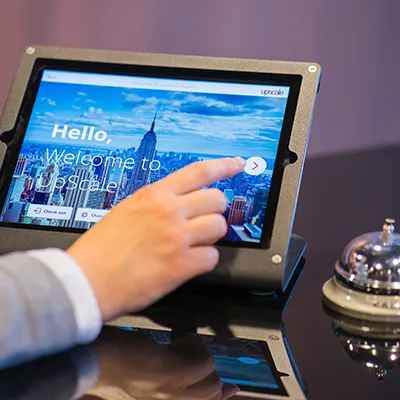
Frequent flyers and coffee lovers rejoiced when Delta and Starbucks announced in Fall 2022 that you can link their rewards programs. Once you link your accounts, you earn SkyMiles with your coffee purchase and Stars when you purchase tickets from Delta. There are also additional perks if you buy your Starbucks pick-me-up on a day that you also fly with Delta.
Lots of hotels offer loyalty programs allowing you to earn points for each dollar you spend at one of their properties. The Raddison Rewards program even has three tiers — Club, Premium, and VIP — so as you earn more points, you also earn more elite status and, therefore, more perks. You can use your points to pay for a future stay as well as put them toward purchases with their airline partners or even donate to charitable causes.
Are loyalty programs worth it?
It’s important to be conscious of your spending habits when you join a loyalty program. If you’re a frequent flyer who tends to travel with the same airline every time, or if you always stay at the same hotel, it would be smart to take advantage of these programs. Chris Elliott has a nice list of who should — and who should not — collect miles and points.
The potential trap is that when people are a member of a loyalty program, they often spend more than if they weren’t trying to earn points. Many of us are excited by the thrill of collecting points, so we end up spending more than we normally would just to get the upgrade.
The question to ask yourself is “If I weren’t a member of the loyalty program, would I still have spent that money?” Too often, the money we spend to get more points is more than we ultimately save. Remember, your points aren’t actually free. You just paid for them when you made a purchase on something else.
What Are Travel Subscription Services?
When you purchase a travel subscription, you pay a monthly or annual fee for access to a service from a travel company. These are usually premium or luxury services and can include things like vacation rentals or upscale hotels, private charter flights, and some credit cards.
Think of travel subscriptions like an Amazon Prime membership. Each month, you pay a flat rate in exchange for free shipping, movies, and select other Amazon services. You pay that rate regardless of if or how much you buy and regardless of whether you watched any movies this month.
Examples of travel subscription services

This helps you avoid being burned by price fluctuations. For example, even if the cost of your ticket shot up by a couple hundred dollars from one day to the next, you still pay the same rate based on your subscription.
Some travel credit cards are subscription services. If you pay an annual fee, you’ll usually get bigger rewards than a card without a fee. Depending on the credit card company, these rewards could be airline miles, priority boarding or free checked bags for flights, airport lounge access, free nights at a hotel, or no foreign transaction fees.
TSA PreCheck is another subscription service for travelers, although you might not initially think of it that way. When you pay the fee with your application, you receive special benefits for five years. Your membership allows you to skip the long security lines at the airport. You also don’t have to remove liquids from your carry-on bags or take off your shoes at security. For frequent flyers or those with young children, simplifying this process is often worth the fee.
Are travel subscription plans worth it?
Whether travel subscriptions are worth the money depends on how much you use them. Like our Amazon Prime example above, if you don’t purchase anything for a month, and therefore don’t need free shipping, then it can feel like a waste of money. However, if you do all your Christmas shopping on Amazon and get a delivery every day, you’ll likely come out ahead financially.
The same goes for travel subscription services. The more you use your subscription, the more cost-effective it is. Eligible flights on Flight Pass includes Alaska Airline flights only within California, Nevada, Arizona, and Utah. So, if you pay the monthly fee but then find you only fly to Chicago, then the answer to whether it’s worth the cost is probably no. However, travelers who fly between Los Angeles and Phoenix frequently could easily come out ahead.
The important thing is to not only carefully examine the services you’re paying for, but also to be honest with yourself about your spending habits. If you don’t travel on the West Coast often, Flight Pass might not be for you. On the other hand, if a travel credit card gives extra cash back on purchases made at supermarkets and you buy groceries for a family of six, then the card’s annual fee could be justified by the payoff.
It’s especially important to be careful with travel credit cards. To make the rewards worth it, you should be paying off your balance in full each month. Otherwise, you’re paying more in interest — 16% or more perhaps — than you’ll ever make in rewards, which is often closer to 3%.
Wander with Long-term Travel Insurance.
Earlier we mentioned our annual multi-trip plans. With these plans, you get:
- Long-term travel insurance
- Customizable coverage for unlimited trips in a year (individual trip length maximums vary by plan)
- Coverage for COVID expenses and other illnesses or injuries that occur when you travel
- Emergency medical evacuation benefits
- 24/7 emergency travel assistance services
If you’re ready to protect your year’s worth of adventures, get a quick quote online. But if you still need more details, we can help with that, too. Talk to one of our licensed travel insurance agents to get all your questions answered before you travel.
Travel Like a Pro with The Wayfinder
Did you enjoy this blog? Get more articles like it before anyone else when you subscribe to our monthly newsletter, The Wayfinder.
- Infographics
- Study Abroad
- Testimonials
- Travel Destinations
- Travel Insurance Advice
- Travel Tips
Search Posts
Newsletter alert
Receive our monthly inspiration and travel tips from the travel insurance experts.

303 Congressional Blvd.
Carmel, Indiana 46032
Our Markets
- Consumer Insurance
- Government Solutions
- Trip Protection
- Trip Protection Annual Multi-Trip
- Trip Protection USA
- Travel Medical
- Partnerships
- 24 Hour Urgent Travel Assistance
- Frequently Asked Questions
- Developer Portal
- System Status
Copyright © 2024 Seven Corners Inc. All rights reserved.
Privacy | Cookies | Terms of Use | Security
CURRENT PRICES END MAY 12
Outside Festival feat. Thundercat and Fleet Foxes.
FROM JUST $44

Should I Use a Travel Agent? Our Travel Expert Says It Makes All the Difference.
The new age of travel agents know how to find deals, book off-the-beaten path adventures, and get you out of any jam. Especially if you know who to use.

Heading out the door? Read this article on the Outside app available now on iOS devices for members! >","name":"in-content-cta","type":"link"}}'>Download the app .
I’ve always thought that planning my own trips was the most cost-effective way, but I’ve been hearing more about travel agents making a comeback and saving their clients a lot of money. What kinds of outdoor trips should I turn to a travel agent for, and are there any who specialize in working with adventurers like me?
Technically, I’m a professional traveler. As a journalist, it’s my job to research and connect with locals to get beneath the surface of a destination. So I have never really used travel agents. What could they plan better than I could?
A lot, it turns out. Over the years, I’ve gotten to know many travel specialists, and I consider them magicians. My big aha moment happened two winters ago on a trip to Iceland . A massive storm shut down internal flights for a day, causing me to miss my return flight to the U.S. Normally, I would have spent frustrating hours on hold with the airline. But because I’d paid $65 to have Ana Gloria Garcia, an air-support specialist at the travel agency EmbarkBeyond, find and book the most affordable and convenient flight option for me, she handled the rebookings while I soaked in the Blue Lagoon.

During the pandemic, agents became advocates helping travelers get refunds on canceled flights and trips. As travel has come roaring back, an agent’s superpower is now their access to the best hotel rooms, most in-the-know guides, free amenities, and more, says Cory Hagopian, senior vice president of sales and partnerships for Virtuoso , a global network of travel agencies.
And they’re attracting a young clientele. According to a recent industry survey , 38 percent of millennials and Gen Zers are opting to use travel agents as opposed to booking on their own trips. That number is far greater than Gen Xers and baby boomers, of whom only 12 and 2 percent respectively use agents.
What Do I Gain from Using a Travel Agent?
I recently had a friend tell me she spent close to 40 hours researching a family trip online. She probably could have gleaned the same intel from an hourlong conversation with a travel adviser. Knowledge is priceless, and advisers act as your insiders. They know what you don’t and fill in the blanks for things you might not have considered, says Erika Richter, a spokesperson for the American Society of Travel Advisors (ASTA). Their firsthand knowledge, vast network, and on-the-ground connections all combine to provide a unique perspective for crafting the perfect itinerary for you.

Most travel advisers specialize in certain regions and countries and travel to them frequently, so they have up-to-date intel on not only the best safari camps but the perfect tent to book for the most incredible views and the best local restaurants you won’t find on Tripadvisor. They want their client’s trips to go well to keep them coming back, so it’s in their interest to have sussed out hotels and itineraries before they send you out into the world.
Nicole Forster, 29, considers herself a savvy traveler. She’s been to 20-plus countries and enjoys destination research. But when it came to planning her honeymoon in Africa, she felt overwhelmed, so she reached out to Danielle Meyer at Coastline Travel Advisors , which specializes in bespoke itineraries. “Originally, I wanted to go to South Africa, Victoria Falls, and Madagascar,” Forster recalls. “Danielle convinced me that if we wanted to relax, we should stay in South Africa and save the other countries for separate trips.”
Over five phone conversations and multiple emails, they crafted a 15-night itinerary that included Cape Town, the winelands, the Cape Peninsula, and a safari at the Thornybush Game Reserve. Forster established her budget early in the process, and Meyer sent her a variety of lodge options to choose from.
“I initially wanted to start with the safari, but she pointed out that we’d be jet-lagged and would need to wake at sunrise for game drives,” says Forster. “The safari was our highlight, so it was a perfect way to end the trip.”

Not only did Meyer book all of the flights, hotels, and transfers, but she created a detailed, day-by-day trip app for the couple that included useful information like check-in times at hotels and how much to tip guides .
Agents also act as advocates. If something goes wrong during your travels, they’re on call 24/7 to handle it. When Forster left the battery and charger for her camera at a hotel, Meyer arranged for an on-the-ground contact to go to a camera store and buy new ones that would be delivered to her hotel the next day.
The cost for the honeymoon planning: $150 per person. “I wouldn’t use a planner for a trip to Hawaii ,” Forster says, “but if I ever took a big trip like this again, I’d 100 percent work with an expert.”
When to Consider Using a Travel Agent
For savvy trip planners, the best time to use a travel agent is for complicated international travel. It can save you hours of planning and peace of mind that if anything goes wrong in your chosen far-flung destination, there’s someone a What’sApp message away to handle it.
Domestically, I’d consider using a travel agent when planning a multi-week national park trip or multi-island trip in Hawaii. They will save you time, guarantee you get the best guides, and help you land reservations at always-booked lodges and hotels.
Dream Trips Delivered
Jessica Cook and her husband both work in the travel industry. Decision fatigued, they handed their honeymoon logistics over to the team at Askari Travel , an agency that specializes in South Africa. Their original plan was also an African safari, but just as they were about to put a deposit down, the Omicron variant of the coronavirus made headlines. Worried about getting stuck abroad, they reached out to Askari’s founder, Muriel Truter, who is from Zimbabwe, and upon her advice, changed their focus to South America.
Knowledge is priceless, and advisers act as your insiders. They know what you don’t and fill in the blanks of things you might not even have considered.
Truter suggested they stick to Colombia rather than country-hop. Cook supplied a budget and a wish list: 12 days, no more than three destinations, a barefoot-luxe feel, and adventures like horseback riding and mountain biking. The rest was a surprise that Askari pretty much nailed, with the exception of one hotel.
“Everything felt so authentic, but this one hotel on Barú island felt really fabricated and was full of American tourists,” recalls Cook. She immediately messaged the Askari team, saying, “Hey, this place really isn’t our vibe,” and within an hour they were on a water taxi headed to Blue Apple, a B Corp hotel—and an Outside pick for tropical adventures —on Tierra Bomba island. “It was honestly the best trip we’ve ever taken,” she says.
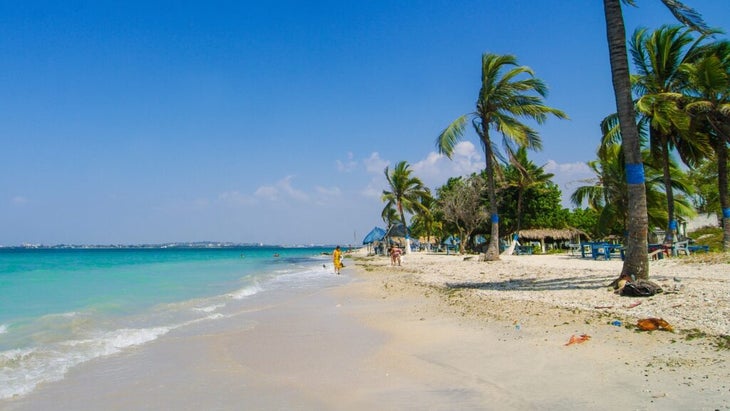
Are Travel Agents Expensive?
It depends. Cost varies. Some travel agencies won’t charge any fee, as they receive a commission from the bookings, while some high-end agencies will charge pricey annual membership fees for their services. Still others charge nominal “professional” fees starting at $150. Fees often fluctuate based on the length and intricacy of a trip and how far out you do the planning (6 to 12 months is recommended). You may occasionally come across agents who charge a percentage of the total trip price or hourly rates.
Basic travel enquiries are generally free. In 2016, Leah Smith, founder of Tafari Travel , opened an old-school brick-and-mortar location in Denver’s Cherry Creek neighborhood so her services would feel less intimidating to first-time users. “With our retail-office location, we’ve become part of the community, and both clients and non-clients are welcome to pop in and ask whatever questions they may have, no charge,” she says.
Matt Lindsay, founder of the surf-guiding and travel company LuxSurf Travel , builds relationships with resorts and property owners to get discounted rates that he can then pass on to guests.

Dominic Allan, the founder of Real Latin America , specializes in travel to Belize and Nicaragua and caters to independent travelers who are happy to book their own flights and hotels but are seeking his local intel. Allan’s three-tier pricing structure starts at $300 for up to three hours of phone calls, during which he might weigh in on where to eat (or not to), the best room to request in a certain lodge, or whether you really need a guide to hike.

Value Versus Savings
If you’re just looking for deals and steals, you might not be ready to work with a travel adviser, says Richter of the ASTA. “Anything you invest in with a travel adviser comes back to you in the form of amenities, customer service, peace of mind, better access to unique experiences, and handcrafted itineraries,” she says. “You could save money by cutting your own hair, too, but most people go to someone who knows what they’re doing.”
Agents work with preferred partners who can guarantee perks for clients, such as free upgrades, early check-in or late check-out, and resort credits. Those add-ons often translate into savings, says Justin Huxter, cofounder of the UK-based Cartology Travel . “We had a client go to Maui for a week, and because of our partnership with the resort, breakfast was included,” he says. When breakfast costs $120 for two, that’s a savings of $840.”

Some of the Best Travel Agents in the Adventure World
Some of my go-to resources for finding a person to work with include travel expert Wendy Perrin’s annual Wow List of tried and trusted agents, the Adventure Travel Trade Association’s adviser network , and the ASTA’s advisor directory .
In addition to the agents mentioned throughout this story, others I highly recommend for adventurous travelers include:
- Dan Achber of Trufflepig , for Africa and the Middle East
- Miguel Cunant of Sri Lanka in Style
- Javier Echecopar of Journey Costa Rica
- Daniel Fraser of Smiling Albino , for Southeast Asia
- Elizabeth Gordon of Extraordinary Journeys , for Africa
- Kleon Howe of the Art of Travel , for French Polynesia
- Jay Johnson of Coastline Travel , for Hawaii and California
- Antonello Losito of Southern Visions Travel , for Puglia, Italy
- Rabia Malik of Fora Travel , for general worldwide travel
- Robyn Mark of Mayamaya Travel , for Africa, the Alps, Patagonia, and Japan
- Marisol Mosquera of Aracari , for Peru and Bolivia
- Zach Rabinor of Journey Mexico
- Raluca Spiac of Beyond Dracula , for Romania

Travel-advice columnist Jen Murphy is now a believer in using a travel agent. Thanks to their expertise and connections, she’s avoided dozens of trip catastrophes.
- South Africa
Popular on Outside Online

Enjoy coverage of racing, history, food, culture, travel, and tech with access to unlimited digital content from Outside Network's iconic brands.
Healthy Living
- Clean Eating
- Vegetarian Times
- Yoga Journal
- Fly Fishing Film Tour
- National Park Trips
- Warren Miller
- Fastest Known Time
- Trail Runner
- Women's Running
- Bicycle Retailer & Industry News
- FinisherPix
- Outside Events Cycling Series
- Outside Shop
© 2024 Outside Interactive, Inc
Six Travel Mistakes to Avoid
No travel medical insurance? Unnecessary luggage and hotel fees? Here are the biggest travel mistakes people make and how you can avoid them.
- Newsletter sign up Newsletter
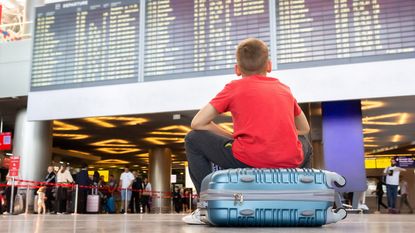
Even the most seasoned tourists can make travel mistakes when planning a vacation. Some blunders can be minor infractions, but others can cost travelers a lot of money and heartache.
But there are steps you can take to avoid travel mistakes. Here are six slip ups that travelers may make this year, plus tips on how to avoid them.
1. Overlooking travel medical insurance
Christopher Elliott , a consumer advocate and founder of the nonprofit Elliott Advocacy , says many people don’t consider purchasing travel medical insurance . “People often think nothing bad will happen before or on their vacation, but then they get injured overseas and need to go to the hospital, and the next thing they’re looking at is a $10,000 hospital bill.” Indeed, nearly one in four Americans report they’ve experienced a medical issue while traveling abroad, according to a 2023 survey sponsored by GeoBlue, an international health insurance company.
Subscribe to Kiplinger’s Personal Finance
Be a smarter, better informed investor.

Sign up for Kiplinger’s Free E-Newsletters
Profit and prosper with the best of expert advice on investing, taxes, retirement, personal finance and more - straight to your e-mail.
Profit and prosper with the best of expert advice - straight to your e-mail.
Unfortunately, most U.S. healthcare plans — including employer group plans, Medicare and Affordable Care Act plans — offer limited or no medical coverage outside the U.S.
How to avoid: One solution is to purchase a travel medical insurance policy, a type of insurance that provides coverage for a range of medical emergencies while traveling abroad, from minor injuries to major events like heart attacks and strokes, to medical evacuation and emergency transport in the case of severe emergencies.
The average travel medical insurance plan costs $89, according to Squaremouth , a travel insurance comparison website. Squaremouth advises international travelers to obtain a policy that provides a minimum of $50,000 in emergency medical coverage and at least $100,000 in medical evacuation coverage.
Note: Some travel insurance policies include emergency medical coverage and medical evacuation coverage up to certain limits.
2. Getting hit with unnecessary luggage fees
You may have heard that a number of airlines — including American Airlines , Delta , and JetBlue Airways — recently raised their prices for checked bags. But one thing a lot of travelers aren’t aware of, Elliott says, is that some are now charging customers more if they check a bag at the airport versus paying to check a bag in advance. For instance, JetBlue customers flying within the U.S., Latin America, the Caribbean and Canada can save up to $20 on their first two checked bags ($10 savings per bag) when they add them to their flight reservation at least 24 hours before departure.
How to avoid: Make sure to pay ahead of time for any bags that you plan to check.
3. Incurring hidden hotel fees
Wi-Fi fees, early check-in fees, gym fees—hotels today charge guests no shortage of extra fees and surcharges . It’s a widespread problem: In an April 2023 survey by Consumer Reports , nearly four out of 10 (37%) U.S. adults said they had experienced a hidden or unexpected hotel fee in the previous two years.
How to avoid: Many hotels offer to reduce or, in some cases, waive certain fees to guests who join their loyalty program, which is free in most cases. Also, sometimes simply asking an employee at check-in to waive certain fees could do the trick.
4. Not utilizing a key search feature on Airbnb
Like hotels, Airbnb rental property owners often tack on extra fees, such as cleaning fees, fees for additional guests beyond a certain number, and service fees. These additional costs can add hundreds of dollars to your bill.
How to avoid: Elliott praised Airbnb for introducing a feature in December 2022 that allows guests to view a stay’s total costs, before taxes, when searching for rental properties. But he says there’s a caveat: “If you’re in the U.S., you need to change a setting in order to see the full rate when you search for rentals.”
To enable the feature, click the slider on the upper right of the search page that says, “Display total before taxes.”
5. Paying full price for a rental car
First, the good news: “The rental vehicle shortage has improved,” Elliott says. That’s resulted in a stabilization of rates, with rental car prices recently averaging $42 a day, up only 3% from last year, according to a report from the travel search company Hopper. The bad news? Renting a car is still more expensive than it was before the pandemic, especially for travelers who pay full freight.
How to avoid: There are several ways you can avoid paying full price. Big-box stores such as Costco , BJ’s and Sam’s Club provide their members discounts on certain rental cars. AARP and AAA also offer their members discounted rates. ( AARP members save up to 30% on base rates at Avis and Budget Rent A Car; AAA members save up to 20% on Hertz rentals). In addition, a number of credit card companies offer certain cardholders rental car discounts when they book a vehicle from specific rental car companies.
You may also be able to nab a lower rate by prepaying when you book a reservation. And, some rental car companies offer limited-mileage plans at a lower cost, which could be a good option if you’re planning to take just a short trip.
Tip: See if your credit card offers rental car insurance before you pay for insurance from a rental car company.
6. Encountering sky-high hotel rates because of Taylor Swift’s European tour
When Taylor Swift performs a concert, sometimes tens of thousands of out-of-town fans descend on the city, causing hotel prices to spike. Consider: the median rate for a standard hotel room during an Eras Tour date in Europe this year is projected to jump by 44%, with average hotel room prices in Warsaw surging a staggering 154% during her tour date there, according to a recent study by Lighthouse , a travel and hospitality research company.
How to avoid: The simplest approach for Europe-bound travelers in 2024, Elliott says, is to avoid traveling to a destination during a Taylor Swift tour date in that city. “When Taylor Swift comes to town all of the hotels sell out, and it becomes very difficult to find a reasonably priced hotel,” he says.
Related Content
- 24 Best Travel Websites to Find Deals and Save You Money
- Five Ways to a Cheap Last-Minute Vacation
- Best Travel Rewards Cards May 2024
To continue reading this article please register for free
This is different from signing in to your print subscription
Why am I seeing this? Find out more here
Daniel Bortz is a freelance writer based in Arlington, Va. His work has been published by The New York Times, The Washington Post, Consumer Reports, Newsweek, and Money magazine, among others.

Healthy Living on a Budget Medicare Part A and Part B leave gaps in your health care coverage. But Medicare Advantage has problems, too.
By Donna LeValley Published 10 May 24

Mother’s Day is Sunday, May 12. Treat your mother or mother-figure to brunch at one of these 30 rave-worthy restaurants.
By Kathryn Pomroy Published 10 May 24

Scammers are targeting college graduates with fake job ads, according to the FTC.
By Alexandra Svokos Published 10 May 24

Shop early and honor mothers everywhere with great deals from Walmart, Amazon, Etsy, Applebee's, Pandora and oh, so many more.
By Kathryn Pomroy Published 9 May 24

Celebrate Teacher Appreciation Week through May 10 with deals from Scholastic, Microsoft, AT&T, Verizon and more.

A new Gallup poll shows Americans are still concerned about having enough money for retirement, but there are some changes from last year.
By Alexandra Svokos Last updated 6 May 24

Jobs Report Slower jobs growth and easing wage pressures are good news for rate cuts.
By Dan Burrows Published 3 May 24

Federal Reserve The Federal Reserve struck a dovish pose even as it kept interest rates unchanged for a sixth straight meeting.
By Dan Burrows Published 1 May 24

Investors of all kinds are eagerly awaiting news from the Federal Reserve meeting. Here is live updates and commentary from Kiplinger experts.

Philips agreed to a $1.1 billion settlement over CPAP and ventilator machines.
By Alexandra Svokos Published 30 April 24
- Contact Future's experts
- Terms and Conditions
- Privacy Policy
- Cookie Policy
- Advertise with us
Kiplinger is part of Future plc, an international media group and leading digital publisher. Visit our corporate site . © Future US, Inc. Full 7th Floor, 130 West 42nd Street, New York, NY 10036.
Coverage that goes where you go: Travel worry-free with Blue Cross Blue Shield
Planning to hit the road this travel season? You’ve got a lot to do! You’ll have to book your travel, lodging and activities, pack and be sure your home is looked after while you’re gone. That’s a lot to think about, and the list goes on. With so much to do, it’s easy to overlook one item that might prove crucial: ensuring that you will be covered if you need medical care while traveling.
Most Blue Cross Blue Shield members can rest easy since Blue Cross Blue Shield coverage opens doors in all 50 states and is accepted by over 90 percent of doctors and specialists. And if your extended travel plans take you abroad, you can ensure you have access to quality care through GeoBlue .
BCBS Coverage Travels with You
If you aren’t sure what’s covered, it’s a good idea to call your Blue Cross Blue Shield company to find out what your benefits are if something goes awry while on vacation. When traveling within the United States, most Blue Cross Blue Shield members will be covered under the BlueCard program, which connects all 36 individual Blue Cross Blue Shield companies so that members can enjoy access to the savings the local Blue Cross Blue Shield plan has negotiated with its doctors and hospitals.
For example, if a member of Blue Cross Blue Shield of Texas, whose Plan includes the BlueCard program, falls and breaks his arm while hiking in Yellowstone, he will be charged the rate Blue Cross Blue Shield of Wyoming has negotiated with the local hospital rather than paying the steep fees he would otherwise encounter. Likewise, a BCBS Wyoming member who falls ill in Dallas would be charged the rate BCBS Texas has negotiated with its local providers. It’s one of the many benefits of belonging to the nation’s oldest and largest health insurance system.
If your plans include international travel, GeoBlue has an extensive network of options to meet your needs when living or working abroad for an extended period of time. Though many Blue Cross Blue Shield plans cover international care in emergency situations, GeoBlu e plans offer the most complete set of benefits and access to services like emergency medical evacuation, which might not be covered by your regular plan.
Insurance Tips for Travelers
Here are a few steps you can take to take charge of your health while traveling:
Traveling Within the United States
- Call your BCBS company to find out what your benefits cover while traveling.
- Always carry your current BCBS ID Card .
- To find nearby doctors and hospitals, call BlueCard Access at 1-800-810-BLUE (2583) or visit the Blue National Doctor & Hospital Provider Finder .
- Call your Blue Plan for precertification or prior authorization if necessary. Refer to the phone number located on your Blue ID card.
Traveling Abroad
- Verify your international benefits with your Blue Plan before leaving the United States, or purchase a GeoBlue plan.
- Always carry your Blue ID card.
- If you need to locate a doctor or hospital, or need medical assistance services, hotlines are available 24/7. You can reach the BlueCard Worldwide Service Center at 1-800-810-BLUE (2583) or call collect at 1-804-673-1177. If you’re a GeoBlue member, call collect at 1-610-254-8771, or 1-800-257-4823 from inside the U.S.
To learn more, visit BCBS.com or the GeoBlue website.
The Blue Cross Blue Shield Association is an association of 35 independent, locally operated Blue Cross and/or Blue Shield companies.
- Shop all deals
- Free phones
- Smartphones
- Fios Home Internet
- Bring your own device
- Accessories
- Refer a Friend
- Verizon Visa® Card
- Certified pre-owned phones
- Apple iPhone 15 Pro
- Apple iPhone 15
- Samsung Galaxy S24 Ultra
- Google Pixel 8 Pro
- Other phones
- Trade in your device
- Tablets & laptops
- Certified pre-owned watches
- Jetpacks & hotspots
- Shop all accessories
- Phone cases
- Screen protectors
- Tablet accessories
- Chargers & cables
- Phone attachments
- MagSafe compatible
- Verizon accessories
- Shop all watch accessories
- Smart watches
- Shop all plans
- International services
- Connected devices
- Discounts overview
- Mobile + Home
- First responders
- Verizon Forward
- Connected car plans
- Shop all home solutions
- 5G Home Internet
- LTE Home Internet
- Accessories overview
- Cables & connectors
- Networking & Wi-Fi
- TV accessories
- Phone equipment
- 5G Home accessories
- Prepaid overview
- Phone plans
- International plans
- Basic phones
- Mobile hotspots & routers
- Why Verizon Prepaid
- Disney+, Hulu, ESPN+
- Apple Arcade
- Google Play Pass
- Apple Music
- Xbox All Access
- Services & perks overview
- Entertainment
- Protection & security
- Digital family
- Financial services
- Back to Menu
- Sign in to My Account
- Prepaid instant pay
- Business Log in
Choose your cart:
- Mobile solutions
- Home solutions
Layer_4 Created with Sketch.
TravelPass® FAQs
TravelPass lets you take your talk, text and data with you to 210+ countries and destinations for a set daily fee. For more information about using your device internationally, visit our Trip Planner .
TravelPass days on us
What is travelpass.
TravelPass lets you use your domestic talk, text and data* in 210+ countries and destinations outside the US for a set daily fee. Calling within the country you're visiting and back to the US are both included with this plan. *High speed data applies for the first 2 GB/day with 3G speeds thereafter. If more than 50% of your talk, text or data usage in a 60-day period is in Canada or Mexico, use of those services in those countries may be removed or limited.
How will I be charged for TravelPass?
You're only charged on days you use your device in a TravelPass country :
- $5/day in Mexico and Canada. Remember, calling, texting and data use in Mexico and Canada are included at no extra cost in our Unlimited mobile plans.
- $10/day in other TravelPass countries.
- If you travel to 2 countries within a single 24-hour session or have a layover in a different country on your way to your final destination, you're still only charged for the first session.
- There's no charge when you're in the US.
What will I be charged if I call another country other than the one I'm visiting or the US?
You will be charged as per your International Long Distance plan. If you do not have one, you will be charged international long distance pay per minute rates.
How does TravelPass work?
After you add TravelPass to your line:
- A 24-hour TravelPass session starts automatically when you use your device in a TravelPass country (e.g., make or answer a phone call, send a text or use data).
- You must turn on cellular data or data roaming when you go to the TravelPass country to use Travel Pass.
- App content refreshing (e.g., Weather apps, Fitness Tracker, etc.)
- Syncing (e.g., with email)
- Device or app software updates
- 2 hours after the session starts we send you a text letting you know when your 24-hour TravelPass session ends. Using your device after that time will start a new session.
Which countries can I call with TravelPass?
With TravelPass, you can call within the country you're visiting and you can call back to the US. If you want to call a different country, add an International Long Distance Plan to your line in My Verizon website or the My Verizon app. If you don't add an international long distance plan you'll be charged international long distance pay per minute rates for these calls.
Can I use Wi-Fi calling with TravelPass?
Wi-Fi calling isn't included with TravelPass. Wi-Fi calling to a country other than the US is charged international long distance rates regardless of whether or not you have an international travel plan.
How do I add TravelPass to my line?
You can add TravelPass to your line by:
- Visiting the Trip Planner in My Verizon.
- Texting the word Travel to 4004.
- For TravelPass to work, you must turn on cellular data or data roaming when you go to the TravelPass country.
Do I have to opt in every day to use TravelPass?
No, you don't need to opt in every day. Add TravelPass once and it stays on your line so you're all set for your next trip. You're only charged for the days that you use your device in a TravelPass country . There's no charge when you're in the US.
How do I get more high speed data once I've reached my limit?
TravelPass gives you high-speed data for the first 2 GB/day. After that, you'll have unlimited data at 3G speeds for the remainder of your TravelPass session. To get more high speed data after you use the daily 2 GB:
- This additional data costs $5 in Mexico and Canada, $10 in all other TravelPass countries.
- Reply speed to get the added high speed data.
You can buy additional 2 GB of high speed data multiple times during a single 24-hour session. Note: Additional high speed data sessions are not available in Andorra, Burundi, Bahrain, Ethiopia, Kiribati, Kosovo, Mauritius, Namibia, Nepal, Pakistan, Sudan, South Sudan, Zimbabwe.
How do I get TravelPass days on us?
You get TravelPass days on us when you have:
- 5G Get More*, 5G Do More* – Get a TravelPass day each month.
- Verizon Visa Card – You get 2 TravelPass days per calendar year if you apply and are approved for the Verizon Visa Card.
*No longer available to add to your account.
Can I see how many TravelPass days I have?
All of your TravelPass days are stored in your TravelPass bank. To view your TravelPass bank:
- In the My Verizon app, tap the Menu icon in the top left corner of the screen.
- Tap Verizon Up .
- Scroll down to Manage your TravelPass days.
You’ll see the number of TravelPass days you have. You can tap Manage to see the expiration dates of each of your TravelPass days and/or transfer* them to another eligible line on your account. *TravelPass days earned with 5G Get More or 5G Do More phone plans can't be transferred to other lines.
How do I use my TravelPass days?
The TravelPass days assigned to your line are automatically used when you have TravelPass active on your line and travel outside the US to a TravelPass country. When you arrive at your international destination, you receive a text message telling you how many TravelPass days you have. Once all your TravelPass days are used, the normal TravelPass daily fee will be applied. Note: TravelPass days aren't eligible for use on cruise ships .
Can I transfer my TravelPass days to another line on my account?
TravelPass days you get through the Verizon Visa Card can be transferred to another eligible line on the account. The Account Owner or Account Manager can make the transfer through the My Verizon app:
- Go to your TravelPass bank in the My Verizon app.
- Tap Manage .
- Tap Reassign next to the TravelPass day you want to transfer to another line.
- Select the eligible line you want to reassign the TravelPass day to.
The TravelPass day is now assigned to that line. Note:
- TravelPass days you receive from your Verizon Visa Card won't automatically be assigned. You can view them and assign them on the Use Rewards tab of the Verizon Up screen in the My Verizon app.
- TravelPass days earned with 5G Get More* or 5G Do More* phone plans can't be transferred to other lines.
Do my TravelPass days expire?
Here's when your TravelPass days expire:
- Verizon Visa Card: TravelPass days expire at the end of the calendar year.
- 5G Get More* and 5G Do More* TravelPass days expire 12 months after you receive them.
Tips on using TravelPass
Length: 1:00
Video Transcript
Verizon TravelPass Hi there! If you're planning on traveling abroad, we have a few simple tips to help you get the most out of your Verizon phone and your TravelPass. Make sure you enable roaming before you go, so that you can use data and voice services internationally. Go to settings, select cellular, then roaming, and make sure data and voice roaming are turned on. Remember, it may take up to three minutes for your phone to connect to local networks. If you experience service issues, be sure to turn your device off, then back on. This is a simple, yet effective way to reconnect your device to the international network while traveling. Making calls while outside the US will always need the international access code followed by a country code, and then the number you're calling. So on your iPhone, hold down the zero until you see the plus sign appear, enter the country code, then dial the number you want to call. And if you call a contact stored on your phone, double check that you've included the "+" and the country code. For more travel tips from Verizon, follow the link below: www.go.vzw.com/traveltips That's all for now! Enjoy your trip!
Additional support
International travel faqs, prepaid travelpass faqs.
- Home Internet & TV
- Mobile + Home discount
- Support overview
- Return policy
- Community Forums
- Business support
- Download My Verizon App
- Accessibility
- Check network status
- Responsibility
- Verizon Innovative Learning
- Consumer info
- 5G overview
- Innovation Labs
- Apple iPhone 15 Pro Max
- Apple iPhone 15 Plus
- Apple AirPods Max
- Apple Watch Series 9
- Elizabeth James
- Terms & Conditions
- Device Payment Terms & Conditions
- Report a security vulnerability
- Mobile customer agreement
- Announcements
- Radio frequency emissions
- Taxes & surcharges
- Legal notices
- facebook-official
- Privacy Policy
- California Privacy Notice
- Health Privacy Notice
- Open Internet
- Terms & Conditions
- About Our Ads
Introduction to TravelSafe Travel Insurance
- Coverage Options
- Purchasing and Managing a Policy
- Customer Service and Support
Compare TravelSafe Travel Insurance
- Why You Should Trust Us
TravelSafe Travel Insurance Review 2024
Affiliate links for the products on this page are from partners that compensate us (see our advertiser disclosure with our list of partners for more details). However, our opinions are our own. See how we rate insurance products to write unbiased product reviews.
TravelSafe Insurance is a travel insurance company owned by the Chester Perfetto Agency, which provides a wide array of travel insurance options such as health, life, and auto insurance. TravelSafe can cover longer trips than many of its competitors, but charges high rates. It's also known for its golf-specific coverage.
- Check mark icon A check mark. It indicates a confirmation of your intended interaction. Up to 120 days' coverage available for travelers ages 79 and under (30 days for 80+)
- Check mark icon A check mark. It indicates a confirmation of your intended interaction. Up to $2,500 per person for missed connections over three hours or more
- Check mark icon A check mark. It indicates a confirmation of your intended interaction. Trip delay coverage of up to $150 per person per day kicks in after six hours or more
- Check mark icon A check mark. It indicates a confirmation of your intended interaction. Policy can be purchased by U.S. citizens living abroad
- con icon Two crossed lines that form an 'X'. Medical coverage ceiling of $100,000 may be low for some travelers' needs.
- con icon Two crossed lines that form an 'X'. Claims reviews from customers say performance is not always the best
- A well-rounded insurance plan for travelers who are concerned about missing connections for cruise-related travel
- Classic and Basic travel insurance plans
- GolfSafe travel insurance plans provide coverage for you and your equipment
- Travel medical insurance through partner Trawick International
Among the companies included in our guide on the best CFAR travel insurance , TravelSafe offers thick insulation against the unpredictability of travel. The trips that TravelSafe can insure are on the higher end of the industry, covering trips lasting up to 150 days and costing up to $100,000. TravelSafe's Classic plan also offers coverage for people who are up to 100 years old.
One standout feature of TravelSafe is that all of its plans offer primary coverage, so you can file immediately with TravelSafe instead of going through your health insurance provider first, even with TravelSafe's Basic plan. Many travel insurance companies only provide primary coverage with their higher-tiered plans.
That said, TravelSafe's Basic plan costs more than many travel insurance companies' most expensive plans. This brings up the issue of cost. While its plans are technically within the bounds of the average cost of travel insurance, TravelSafe certainly stretches those limits, and it's certainly more expensive than many of the best travel insurance companies.
Ultimately, TravelSafe is best for travelers taking an expensive trip who can afford expensive insurance.
Coverage Options from TravelSafe
TravelSafe has two main policies for those seeking travel insurance: travel insurance for stateside and international travelers and travel insurance for those who are planning golf trips. For each policy type, travelers can choose between classic and basic coverage. And golfers can choose between GolfSafe Secure and GolfSafe Secure Plus.
Here's how the three TravelSafe travel insurance plans stack up in terms of what's included and coverage limits:
TravelSafe also offers specific golf insurance plans, which is something incredibly unique among travel insurance companies. If you're an avid golfer, purchasing golfing insurance will cover things like lost holes, something regular travel insurance won't. TravelSafe's golf insurance plan benefits are as follows:
Additional coverage options from TravelSafe
TravelSafe offers several optional coverages for its travelers:
Rental car damage and theft coverage: Available for both Basic and Classic plans, this add-on covers up to $35,000 per covered vehicle.
Business and sports equipment rental: Also available for both TravelSafe plans, your rental equipment is covered for up to $1,000.
CFAR coverage: Only available for Classic+, you'll receive 75% of your nonrefundable trip costs. You must purchase your policy within 21 days of your initial trip deposit.
TravelSafe Travel Insurance Cost
The premium you pay will depend on various factors, including the age of the travelers, destination, and total trip costs. The average cost of travel insurance is 4% to 8% of your travel costs.
After inputting some personal information, such as your age and state of residence, along with your trip details, like travel dates, destination, and trip costs, you'll get an instant quote for TravelSafe plans available for your trip. And from there, it's easy to compare each option based on your coverage needs and budget.
Now let's look at a few examples to estimate TravelSafe coverage costs.
As of 2024, a 23-year-old from Illinois taking a week-long, $3,000 budget trip to Italy would have the following travel insurance quotes:
- Basic: $112
- Classic: $147
- Classic (Plus): $274
Premiums for TravelSafe plans are between 3.7% and 9.1% of the trip's cost, within and above the average cost of travel insurance.
TravelSafe provides the following quotes for a 30-year-old traveler from California heading to Japan for two weeks on a $4,000 trip:
- Basic: $153
- Classic: $202
- Classic (Plus): $377
Once again, premiums for TravelSafe plans are between 3.8% and 6.3% of the trip's cost, within the expected range of travel insurance costs.
A Texas family consisting of two 40-year-old parents with a 10-year-old and 4-year-old on a two-week trip to Australia for $20,000:
- Basic: $512
- Classic: $676
- Classic (Plus): $1,616
TravelSafe plans cost between 2.6% and 8.1% of the trip's cost, below and within the average cost of travel insurance.
A 65-year-old couple looking to escape New Jersey for Mexico for two weeks with a trip cost of $6,000 would have the following quotes:
- Basic: $472
- Classic: $582
- Classic (Plus): $952
Premiums for TravelSafe plans are between 7.8% and 15.9%, which is well the average cost for travel insurance. While older travelers should expect higher premiums, these prices are on the higher end of what you should be paying.
Purchasing and Managing a TravelSafe Policy
Purchasing a TravelSafe policy is fairly simple. You'll first need to obtain a quote through TravelSafe's website. Be prepared to provide the following details:
- State of residence
- Destination(s)
- Departure/return dates
- Date of initial deposit
- Total trip cost
- Number of travelers
- Birthday of traveler(s)
Once you obtain a quote and pick your plan, you'll enter some additional information about yourself, such as your address and contact information.
How to File a Claim with TravelSafe
If you experience a loss while insured by TravelSafe, you need to act quickly. You have 20 days after the loss to notify TravelSafe, at which point an agent will send you forms for filing proof of loss. If TravelSafe don't send a form withi 15 days, you can send your own written statement about what happened along with proof. This must be completed within 90 days of the loss.
You have several options if you need to file a claim for TravelSafe.
If you need emergency help, you can call their toll-free numbers below.
- Toll-free (US-only): 1-877-539-6729
- Direct: 1-727-475-2808
If you're international, call the following toll-free number: 1-866-509-7713.
TravelSafe Customer Service and Support
Almost all reviews for TravelSafe are concentrated on its SquareMouth page, where it has an average rating of 4.3 stars out five across over 1,500 reviews. Though an overall positive score, it's worth mentioning that most of the positive reviews come from people who didn't have to file a claim. Some of these reviews mentioned having to alter their insurance plan, which was an overall positive experience.
However, many of the reviews that mention the claims process are negative. Customers mentioned long wait times, uncommunicative claims representatives, and little guidance during the claims process. Additionally, while many travel insurance companies regularly engage with reviews, both positive and negative, TravelSafe rarely replies to customer reviews.
Learn more about how TravelSafe travel insurance compares against top insurers.
TravelSafe Travel Insurance vs Faye Travel Insurance
Faye Travel Insurance is a completely digital travel insurance company. Unlike TravelSafe, Faye Travel Insurance completely covers all cruise travel. Faye doesn't cover golf trips as TravelSafe does. They have similar amounts of coverage, but Faye Travel Insurance is about $20 cheaper for its comparable international plans.
Faye Travel Insurance covers your trip, your health, and your belongings just like TravelSafe does. But with Faye Travel Insurance, you can add different things that meet your needs, like car rental, extreme sports, and pet care.
Read our Faye travel insurance review here.
TravelSafe Travel Insurance vs World Nomads Travel Insurance
TravelSafe is an excellent option if you're traveling and participating in regular activities, like trying different foods and basic activities, like taking a train to places. But if you want to do extreme sports, it might not be the right coverage for you. Instead, consider getting a travel insurance plan like World Nomads Travel Insurance . World Nomads covers over 100 different extreme sports, and you can specifically add on different sports that you want to try. It's a better coverage insurance plan for someone who's a little bit more adventurous.
That said, if you're only planning on doing a specific activity, like golfing, TravelSafe has a plan for you. They cover golfing trips specifically with more coverage than World Nomads.
Read our World Nomads travel insurance review here.
TravelSafe vs Credit Card Travel Insurance
Some credit cards, especially travel rewards cards, come with travel benefits such as primary rental car insurance for your vehicle if you decide to rent one. However, travel insurance is generally more comprehensive than credit card coverage. For example, TravelSafe offers benefits like death and dismemberment coverage; credit cards don't typically cover this benefit.
However, you can use both your credit card benefits and your travel insurance to get the fullest coverage possible.
Read our guide on the best credit cards with travel insurance here.
TravelSafe Travel Insurance FAQ
Yes, TravelSafe is known for providing reliable coverage for international travel, including medical emergencies and trip interruptions.
TravelSafe typically allows the purchase of travel insurance up until the day before departure, making it suitable for last-minute travel plans.
TravelSafe offers policies that include coverage for trip cancellations due to COVID-19, but it's important to review the specific terms and conditions of each plan.
Claims with TravelSafe are generally handled efficiently, with a straightforward process for filing and tracking claims, and timely reimbursements according to customer feedback.
Yes, TravelSafe offers the option to add adventure sports coverage to their policies, catering to travelers who engage in higher-risk activities.
Why You Should Trust Us: How We Reviewed TravelSafe
For this review, we made sure to include the most updated information and pulled real-time quotes from TravelSafe's website. We compared two different companies that had similar coverage to TravelSafe to ensure the best review possible. We only included reputable plans. And we looked at factors like what's covered, policy limits, and coverage options.
Read more about how Business Insider rates insurance products here.
Editorial Note: Any opinions, analyses, reviews, or recommendations expressed in this article are the author’s alone, and have not been reviewed, approved, or otherwise endorsed by any card issuer. Read our editorial standards .
Please note: While the offers mentioned above are accurate at the time of publication, they're subject to change at any time and may have changed, or may no longer be available.
**Enrollment required.

- Main content
Human-sounding AI can plan, help book your travel. But can you trust it?

It wasn’t so long ago that travelers planned trips without the internet.
“Back in the day, our parents used to go to these travel agents and really kind of express what they were looking for and what kind of vacation they wanted,” said Saad Saeed, co-founder and CEO of Layla, an AI travel planner whose website launched this year. “Slowly, we kind of acclimatized ourselves to start using these search boxes, clicks, these forms and filters.”
Artificial intelligence-driven tools like Layla can now turn back the clock on that experience, engaging with users almost like humans to customize travel plans with lightning speed plus all the resources of the web. But does AI actually make travel planning easier and can it compare to human expertise?
Yes and no. Here’s why.
Can AI actually understand us?
It can try.
“What are you personally looking for in this trip and what do you want out of it?” asked Saeed. “Do you want to reconnect with your partner, for example, or do you want to just feel some adventure and thrill?”
A human travel agent may ask a series of questions to understand a client’s needs. So can generative AI , which picks up on keywords. Mindtrip, an AI planner launched publicly on May 1, has an actual travel quiz that asks users to rank priorities like “Is your ideal vacation day an exhilarating adventure or a relaxing break?” using sliding scales.
“What we get at the end of that quiz, using the AI, is a really customized description,” explained Mindtrip Founder and CEO Andy Moss. That then informs what the AI suggests to the traveler.
Informed suggestions can save users time in narrowing down destinations and experiences, as well as introduce places users may never have discovered on their own.
AI travel planning is here: How to use it to plan your next vacation and what you should know first
Can AI fully replace humans?
No. Layla may sound human, using conversational phrases like “I've got three cozy nests that won't make your wallet cry.”
“She has a personality. We try to make her funny and so on, where it's really that friend that can get to know you and then recommend you the perfect stuff,” Saeed said.
But part of Layla’s expertise comes from the real-life experiences of some 1,600 travel content creators the Berlin-based platform has partnered with. Their videos and insights can give users a richer picture of what to expect.
Mindtrip also leans on human expertise, having tapped a limited group of travel influencers for curated content with plans to eventually open it up so anyone can share their travel itineraries and experiences with the public.
Story continues below.
Is AI a threat to privacy?
With all the rapid advancements in AI in just the past year, some users are wary of its safety .
“Data privacy is definitely one of our biggest concerns, and we ensure that none of the personal identifiable information ever reaches basically the model providers. That will all stay with us,” Layla’s Saeed said. “None of their personally identifiable data can ever be basically used to profile them or basically go into any of these systems, which are training these different models.”
Booz Allen Hamilton, the nation’s largest provider of AI to the federal government , focuses heavily on ethical and secure AI, as well as adhering to the government’s policies on data collection.
“We collect as little information as we can in order to provide a secure transaction,” said Booz Allen Hamilton Senior Vice President Will Healy, who heads up their recreation work, including Recreaton.gov , the government’s central travel planning site for public lands like national parks. “We don't save your searches. We don't save your credit card data. We're very careful about the data that we store.”
Yoon Kim, an assistant professor in MIT’s Electrical Engineering and Computer Science Department and Computer Science and Artificial Intelligence Laboratory , isn’t too worried about security in the initial brainstorming stages of travel planning with AI.
“I don't see, at this point, how AI-generated advice is spiritually different from travel guide articles that you might read on certain websites,” he said. “Travel planning is one really nice use case of these models, as narrow as it is, because it's a scenario in which you want to be given ideas but you don't actually need to commit to them.”
What’s next for AI?
Things could be different, though, if AI is used beyond trip planning. Deloitte sees AI being woven into all parts of travel.
“There is an opportunity for a real engine – I'm going to just use a generic term, engine – that allows you to search and pull it all together and to sort based off of your personal reasons for prioritization and then not stopping at ‘hey give me a list’ or ‘here's what to do,’ but ‘OK, now go create my itinerary, help me book it, track it all the way through that travel process,” said Matt Soderberg, principal, U.S. airlines leader for Deloitte.
Deloitte’s Facing travel’s future report, released in early April, identifies seven stages where AI can intersect with a trip, from personalized recommendations based on past travel, online purchases and tendencies to day-of issues to a post-travel pulse, where travelers may be asked about their experience and start thinking about future trips.
“When you solve across all of those, that's going to be the Holy Grail,” Soderberg said. “The difficulty is that doesn't all sit in one place. And so how do you get the right information and the right data to bring all of that together for a single experience for the consumer? And who's going to own that?”
Layla and Mindtrip, among others, already offer booking through partners like Booking.com. “It's all about making things actionable,” Moss said.
But for now, if issues come up mid-trip, AI tools can’t fix them like humans can. Humans still have to get involved.
Politics latest: Keir Starmer accused of 'rank hypocrisy' by Rishi Sunak after setting out what he'll do to tackle small boat crossings
Labour leader Sir Keir Starmer lays out his party's plans to try and tackle small boat crossings if it wins power. Listen to the latest episode of the Electoral Dysfunction podcast as you scroll.
Friday 10 May 2024 18:30, UK
- Starmer says small boat crossings 'one of the greatest challenges we face'
- Explained: What's in Labour's plan to try and tackle problem
- Darren McCaffrey: Will Labour's plan cut it with voters?
- Starmer says no flights to Rwanda will take off under Labour
- Sunak accuses Starmer of 'rank hypocrisy'
- Electoral Dysfunction: Jess Phillips says Elphicke defection like 'being punched in gut'
- UK exits recession | Economy 'returning to full health'
- Faultlines: Can British farming survive?
- Live reporting by Tim Baker
Across the UK, anger is brewing amongst some farmers.
Protests have already been held in London, Dover and Cardiff, with more planned - mirroring similar tensions seen across Europe in the last six months.
They say they’re annoyed about cheap foreign imports and changes to subsidies forcing them to give up land in favour of environmental schemes.
But what does this mean for the food on our table - and does British produce risk becoming a luxury product for the wealthy only?
On the Sky News Daily , Niall Paterson is joined by West of England and Wales correspondent Dan Whitehead to find out why farmers are so concerned, and speaks to Liz Webster, the founder of Save British Farming, about why she believes eating British isn't just good for our farmers - it's good for the nation's health, too.
In response to our report, Farming Minister Mark Spencer, said: "We firmly back our farmers. British farming is at the heart of British trade, and we put agriculture at the forefront of any deals we negotiate, prioritising new export opportunities, protecting UK food standards and removing market access barriers.
"We've maintained the £2.4bn annual farming budget and recently set out the biggest ever package of grants which supports farmers to produce food profitably and sustainably."
The Welsh government said: "A successful future for Welsh farming should combine the best of our traditional farming alongside cutting-edge innovation and diversification.
"It will produce the very best of Welsh food to the highest standards, while safeguarding our precious environment and addressing the urgent call of the climate and nature emergencies."
👉 Listen above then tap here to follow the Sky News Daily wherever you get your podcasts 👈
Following the defection of the Dover and Deal MP Natalie Elphicke to Labour, Beth, Ruth and Jess discuss the surprise move and whether it could have been handled differently by Sir Keir Starmer.
They also talk about Beth's interview with the former immigration minister Robert Jenrick and his warnings about Reform UK.
Plus, how significant was the defeat of former Conservative mayor of the West Midlands Andy Street? Beth and Jess were both there to tell the story.
And they answer a question on Labour and the Muslim vote, and what the party can do to restore confidence and trust.
Email Beth, Jess, and Ruth at [email protected] , post on X to @BethRigby, or send a WhatsApp voice note on 07934 200 444.
👉 Listen above then tap here to follow Electoral Dysfunction wherever you get your podcasts 👈
In January 2023, Rishi Sunak made five promises.
Since then, he and his ministers have rarely missed an opportunity to list them. In case you haven't heard, he promised to:
• Halve inflation • Grow the economy • Reduce debt • Cut NHS waiting lists and times • Stop the boats
See below how he is doing on these goals:
The Sky News live poll tracker - collated and updated by our Data and Forensics team - aggregates various surveys to indicate how voters feel about the different political parties.
With the local elections complete, Labour is still sitting comfortably ahead, with the Tories trailing behind.
See the latest update below - and you can read more about the methodology behind the tracker here .
Speaking to Sky political editor Beth Rigby , Sir Keir Starmer has defended his decision to allow Tory MP Natalie Elphicke into Labour.
Ms Elphicke was on the right of the Conservative spectrum, and previously defended her sex-offender ex-husband, comments which she apologised for this week following her defection.
Addressing Tory voters, Sir Keir says he wants Labour to be a "place where they who have ambitions about their families, their communities, their country, can join and be part of what we are trying to build for their country".
Asked by Beth if he was ruthless, Sir Keir said: "Yes, I'm ruthless in trying to ensure we have a Labour government that can change this country for the better.
"Not ruthless for my own ambition, not ruthlessness particularly for the Labour Party - I'm ruthless for the country.
"The only way we'll bring about a change in this country is if we're ruthless about winning that general election and putting in place a government of public service, that’ll be a major change.
"Politics, I believe, should be about public service, that's what I've been about all my life."
More now from political editor Beth Rigby's interview with Labour leader Sir Keir Starmer.
She reminded him that he previously ruled out doing a deal with the SNP - but has not done so for the Liberal Democrats.
Sir Keir again ruled out a coalition with the SNP - adding that he is aiming for a "majority Labour government".
He says Labour needs "to keep working hard, keep disciplined and getting our message across, which is something fundamental to me".
Pushed on his lack of ruling out a possible agreement with the Lib Dems, Sir Keir says: "I'm going for a majority.
"That's the answer I gave you a year ago. It's the same answer I'm giving you now."
Sir Keir Starmer was earlier today pushed on whether Rwanda deportation flights will take off if he was prime minister - although it was not clear if he would cancel flights which had already been organised.
Sky News understood that previously booked deportation flights to Rwanda would still go ahead if Sir Keir entered Number 10.
But the Labour leader has now gone further.
Speaking to political editor Beth Rigby , Sir Keir has ruled out any flights taking off.
"There will be no flights scheduled or taking off after general election if Labour wins that general election," he says.
He says: "Every flight that takes off carries with it a cheque to the Rwanda government.
"So I want to scrap the scheme - so that means the flights won't be going."
Sir Keir says he would rather spend the money on his own measures to counter small boats.
"No flights, no Rwanda scheme. It's a gimmick," he says.
By Alix Culbertson , political reporter
Scotland's new first minister has told Sky News that the controversial gender recognition reforms "cannot be implemented."
John Swinney, who became first minister this week , has faced questions over his stance on gender recognition after MSPs voted in 2022 to pass a bill to make it simpler for people to change their gender without having to obtain a medical diagnosis.
The UK government blocked the bill from being made into law and the Supreme Court rejected a request by the Scottish government for a judicial review.
Asked if he would be fighting to push the bill through, Mr Swinney told Sky News: "The reality of the situation we face is that the Supreme Court has said that we can't legislate in that area. We can't take forward that legislation."
The UK economy is no longer in recession, according to official figures.
Gross domestic product (GDP) grew by a better-than-expected 0.6% between January and March, the Office for National Statistics (ONS) said.
Economists had predicted the figure would be 0.4%.
Prime Minister Rishi Sunak said it showed the economy had "turned a corner".
He told Sky News's Ed Conway: "I am pleased that while there's more work to do, today's figures show that the economy now has real momentum, and I'm confident that with time, people will start to feel the benefits of that.
"We've had multiple months now where wages are rising, energy bills have fallen, mortgage rates are down and taxes are being cut... I'm pleased with the progress that we're making."
Mr Sunak added: "I am confident the economy is getting healthier every week."
You can read more here:
Rishi Sunak has criticised Sir Keir Starmer's position on Rwanda as "rank hypocrisy".
Speaking to broadcasters, the prime minister says the Labour leader has announced things the government is "already doing".
He gives the example of "punching through the backlog, having more law enforcement officers do more, that's all happening already".
"We've announced all of that more than a year ago," the prime minister adds.
"The question for Keir Starmer if he cares so much about that, why did he vote against the new laws that we passed to give our law enforcement officers new powers?
"They've now used those to arrest almost 8,000 people connected with illegal migration, sentenced them to hundreds of years in prison.
"And if it was up to him, all those people would be out on our streets, so I think it's rank hypocrisy property of his position."
Be the first to get Breaking News
Install the Sky News app for free


COMMENTS
The upside of working with a travel agent is having someone plan an epic vacation for you based on industry knowledge and local expertise. But this can also be a downside in the event you discover ...
My policy also offers a $3,000 annual trip cancellation benefit, $20,000 in emergency medical coverage, $100,000 in emergency transportation (including medevac services), $45,000 in rental car theft and damage protection, $25,000 in travel accident coverage and $1,000 for essentials in the event of baggage loss or damage, along with a handful ...
In most scenarios, travel insurance reimburses you for your covered financial losses after you file a claim and the claim is approved. Filing a claim means submitting proof of your loss to Allianz Global Assistance, so that we can verify what happened and reimburse you for your covered losses. You can file a claim online, or do it on your phone ...
2. Allianz. For our sample itinerary, Allianz offered three different annual travel insurance plans with varying levels of coverage — Executive, Prime and Basic. The cheapest rang in at $138 for ...
How to use your travel insurance. Travel insurance works like most insurance policies. You purchase coverage for a period of time to protect against certain risks. When a covered event occurs, you ...
A travel insurance policy typically costs between 4 and 10% of the overall price of your trip. The cost can vary: Plans with higher limits and more optional coverage cost more. A plan with a CFAR ...
Annual travel insurance plans can typically be purchased online or through a travel insurance provider's call center. Payment options vary depending on the provider, but may include: Credit card.
Travel insurance is a valuable way to limit the risks associated with travel, deserving of consideration by every traveler. Despite its many benefits, there remains a great deal of confusion, and even skepticism, surrounding travel insurance.. Perhaps the perceived complexity of travel insurance plans and our reluctance to prepare for worst-case scenarios prevents us from discovering the many ...
Atlas Journey Preferred is the cheapest of our 5-star travel insurance plans. Atlas Journey Premier has $150,000 in primary medical coverage. Both plans have top-notch $1 million per person in ...
Most travel insurance plans can cover up to 100%, 125% or 150% of your insured trip costs if you must interrupt your trip and return home for a covered reason. The 125% and 150% coverage levels offered in certain plans are meant to compensate for travel being more expensive if you book at the last minute to return home.
Trip cancellation benefits begin on your plan's effective date, as long as we receive your premium before you cancel your trip or make a claim. Annual travel insurance can include rental car coverage. Each AllTrips plan includes up to $45,000 in rental car damage and theft coverage, whether you're traveling in the U.S. or internationally.
The destination. After analyzing five trips across 49 different travel insurance policies, we found the average travel insurance premium was $377. The lowest plan cost $152, while the most ...
Travel insurance works in the same manner as other kinds of insurance policies, such as plans to protect a home, car, or other valuable assets like jewelry. Travel insurance plans protect certain ...
With these plans, you get: Long-term travel insurance. Customizable coverage for unlimited trips in a year (individual trip length maximums vary by plan) Coverage for COVID expenses and other illnesses or injuries that occur when you travel. Emergency medical evacuation benefits. 24/7 emergency travel assistance services.
Travel medical insurance can cover the cost of medical care, hospitalization, imaging, lab work and prescription medication if you get sick while traveling. Many U.S. health insurance plans do not ...
What does travel insurance cover? Emergency evacuation: Comprehensive plans can arrange an emergency medical evacuation if you're hospitalized during your trip and an attending physician determines that you need to get to another hospital for proper care. Medical coverage: Comprehensive plans offer reimbursement for covered medical treatment received during your trip and may be beneficial if ...
Families choose their level of coverage when they purchase a travel insurance policy. A comprehensive policy is the safest option for all kinds of family travel because it provides well-rounded ...
If you plan to engage in activities like this, work with a travel insurance agent to compare adventure travel insurance plans to make sure your particular activities will be covered. Other exclusions
For savvy trip planners, the best time to use a travel agent is for complicated international travel. It can save you hours of planning and peace of mind that if anything goes wrong in your chosen ...
The average travel medical insurance plan costs $89, ... His work has been published by The New York Times, The Washington Post, Consumer Reports, Newsweek, and Money magazine, among others. ...
Health Insurance. Call (855) 596-3655 to speak with a licensed insurance agent and get quotes for car, home, or renters insurance. Travel health insurance pays for emergency medical costs when you're traveling outside the U.S. A travel medical policy can protect you against unexpected accidents and illnesses.
If your plans include international travel, GeoBlue has an extensive network of options to meet your needs when living or working abroad for an extended period of time. Though many Blue Cross Blue Shield plans cover international care in emergency situations, GeoBlu e plans offer the most complete set of benefits and access to services like ...
Instead, pack clothes that all go together and can be mixed and matched easily. I like to keep all the clothes I bring in the same family of colors, with a few basic templates: pants + shirt + cardigan + scarf, say, and then I bring 2 pairs of pants and 4 shirts and 2 scarves to mix and match.
Learn how to get 3TravelPass Days for $10/month with Unlimited Plus and Unlimited Welcome. A $30/month value. Find out how to add and manage this perk. Explore plans that you can add this perk to. Choose Manage plan to change your current plan and add perks. Am I eligible to get the 3 TravelPass Days perk?
After you add TravelPass to your line:. A 24-hour TravelPass session starts automatically when you use your device in a TravelPass country (e.g., make or answer a phone call, send a text or use data).; You must turn on cellular data or data roaming when you go to the TravelPass country to use Travel Pass.; Please remember that once your cellular data or data roaming is turned on, a TravelPass ...
Classic: $676. Classic (Plus): $1,616. TravelSafe Insurance plans cost between 2.6% and 8.1% of the trip's cost, below and within the average cost of travel insurance. A 65-year-old couple looking ...
5GB of high-speed data in 11 European countries. Unlimited basic data that's 2x faster than before in 215+ countries & destinations, unlimited texting, and $0.25/min calling. Shop plans. Up to 5GB high-speed data in select Central European countries; otherwise, basic speeds approximately 256 Kbps. See full terms.
A human travel agent may ask a series of questions to understand a client's needs. So can generative AI, which picks up on keywords. Mindtrip, an AI planner launched publicly on May 1, has an ...
Find international travel requirements, including any forms you might need to complete. See what travel documents you need for your destination, including visa, passport, and health info. Travel to and from certain airports might be impacted. View our Travel Alerts page for the most up-to-date information about your flight options.
Asked if he has a plan to deter people, Sir Keir says his primary goal is to stop the people-smuggling gangs. He says that saying a deterrence like Rwanda works is not borne out by the evidence ...